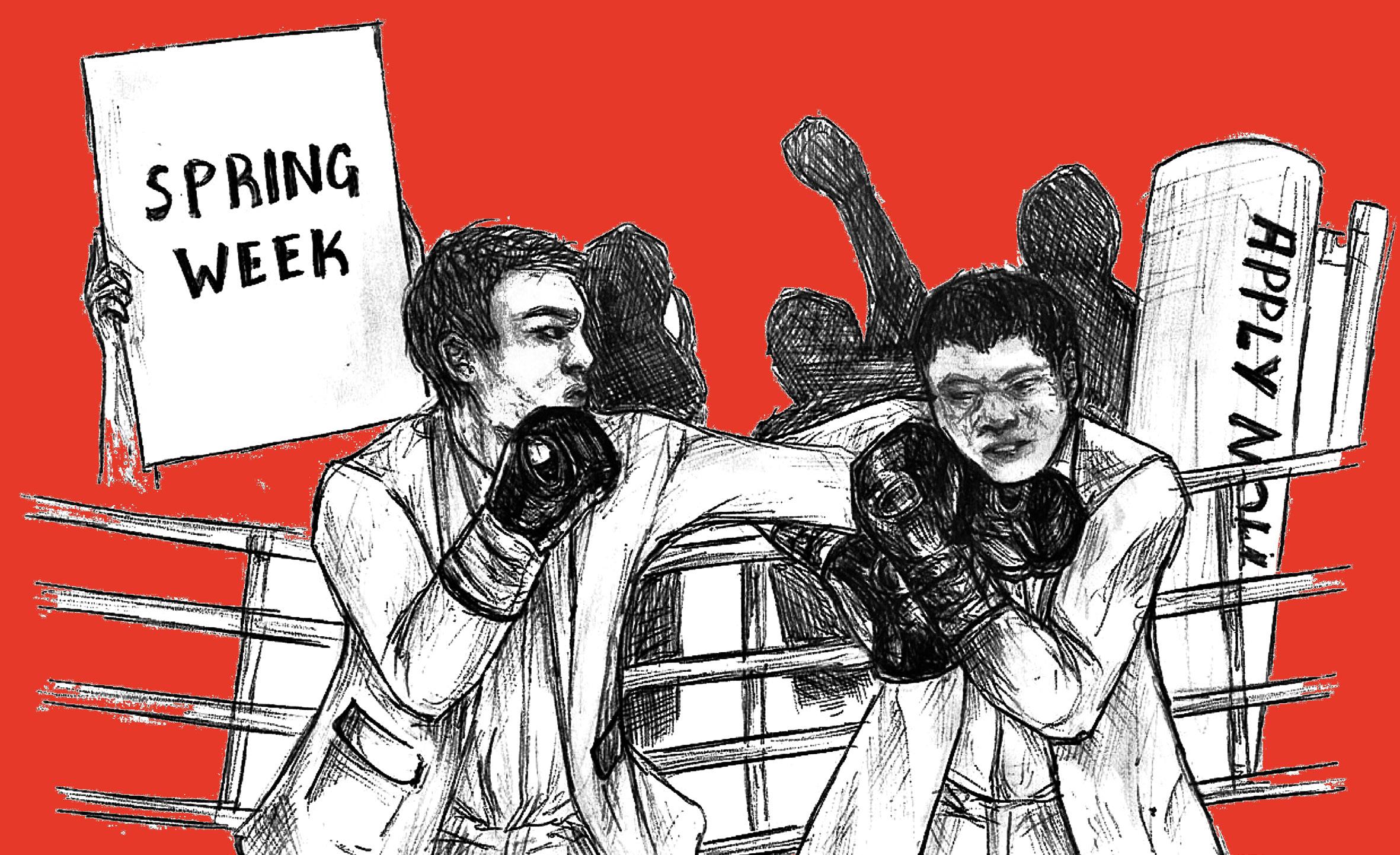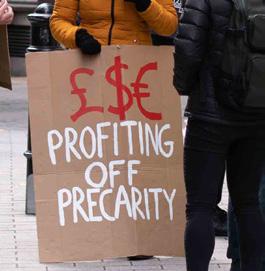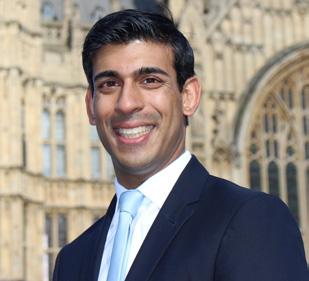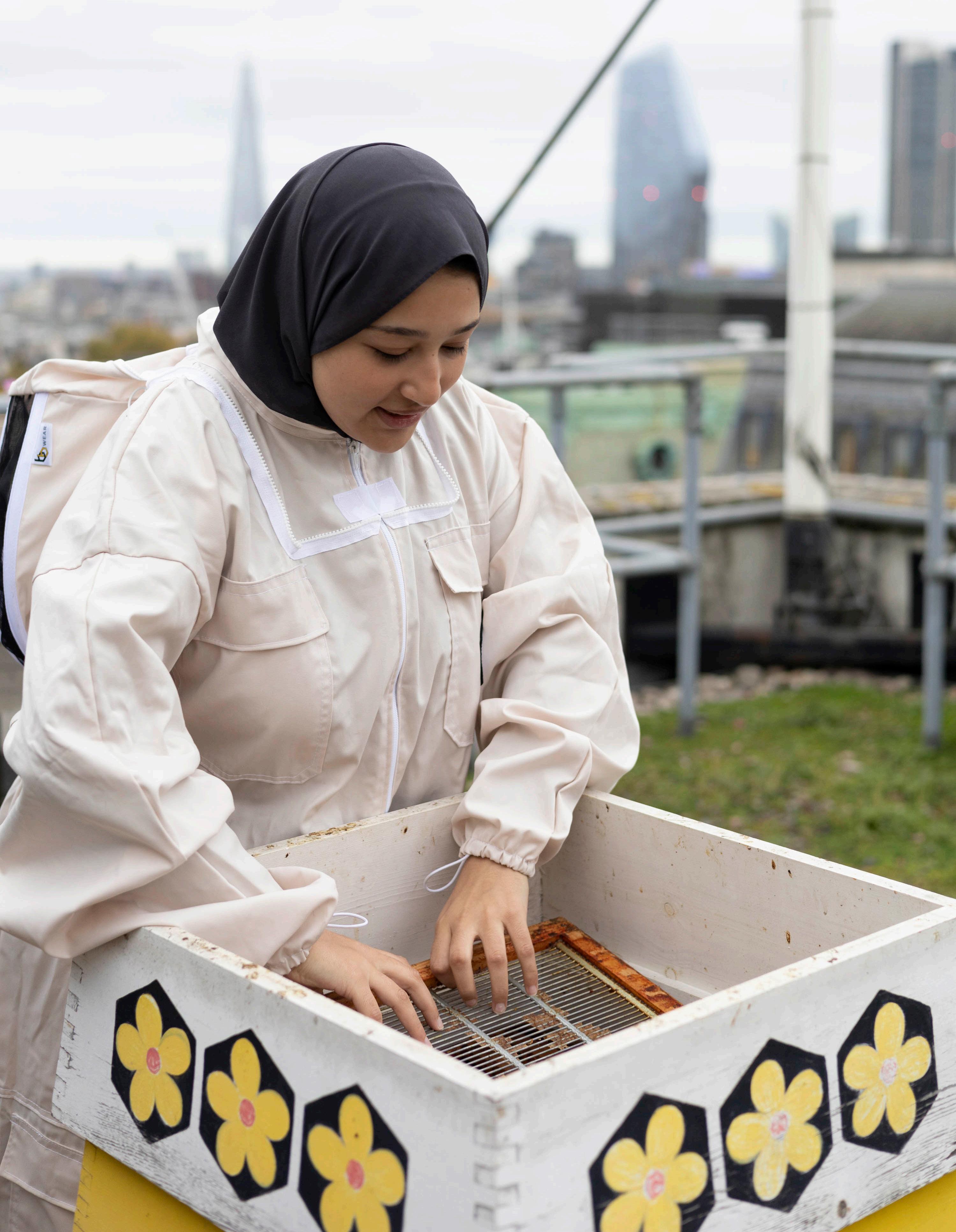e Beaver investigates: how LSE students cheat their way to internships


News
UCU Strikes this November, page 3
SU’s campaign to bring back LSE nursery, page 6
Features
What is ‘Black LSE’? page 8
LSE is failing international students, page 10
Opinion
Resist your corporate futurestay in school!
 Amadea Hofmann
Sta Writer
Illustrated by Noora Belcaid
Amadea Hofmann
Sta Writer
Illustrated by Noora Belcaid
LSE is known for its rigorous, career-focused nance culture, ranking rst globally in feeding students into front-o ce investment banking jobs. But what makes LSE students so
successful in the application process – and what lengths do they go to?


is article began as an exploration of students’ experiences at notoriously abusive investment banks, but it soon became clear that an equally competitive culture exists at LSE that pushes

students to extremes.
My rst interviewee was a third-year Finance student who did the impossible: he received ten spring week acceptances in the 2020/2021 application cycle. When I started asking questions about LSE nance culture, he stopped me and promised to speak “explicitly”

and “honestly”– under the condition that he is made anonymous. I agreed, and so, Jordan* – someone who has excelled at applications and been described as a “big name” within the nance community on campus – revealed the insand-outs of the corporatedriven “ nance bro” culture at LSE. Continued on page 3
page 11
Rishi Sunak became PM because he’s boring, page 13
& WHAT’S ON BEAVER SOUND? See page 21!

BEEKEEPING Newspaper of the LSE Students’ Union: Making Sense of LSE Since 1949 Issue 923 | MT Week 8
INSIDE TODAY
& flip for... BEEKEEPING
Executive Editor
Aarti Malhotra executive.beaver@lsesu.org

Managing Editor Vani Kant managing.beaver@lsesu.org
Flipside Editor Ambre Pluta editor. ipside@lsesu.org
Beaver Editor Jack Beeching editor.beaver@lsesu.org

Multimedia Editor Vaneeza Jawad multimedia.beaver@lsesu.org

News Editors
Aysha Sarah
Klara Woxstrom

Features Editors




Alan Nemirovski

Bora Bayram
Opinion Editors
Alina Chen
Honour Astill
Part B Editors
Sana Agarwal
Anouk Pardon
Review Editors
Ben Helme
Syed Zaid Ali

Sport Editors
Noah Poll
Alex Bowley
Social Editor

Liv Kessler
Podcast Editors
Lily Whittle

Dillon Loh
Illustration Heads
Charlie To
Anoushka Guli
Photography Heads

Claire Oh
Oluchi Egbom

Videography Head
Jessy Yang




On gratitude
Aarti Malhotra Executive Editor




For someone whose every decision is cardinally rooted in cynicism and doubt, I’ve been feeling surprisingly grateful as of late.
I suspect the catalyst was last formatting weekend. ere were some di cult decisions to be made, but not once did I feel I had to carry that weight alone. My team was there every step of the way, even during times they explicitly disagreed with me.
When I was considering running for exec earlier this year, I was initially hesitant





Stop and think
Jack Beeching Beaver Editor
Landscape with the Fall of Icarus (1558) is a painting by Pieter Bruegel. In the foreground there is a farmer, ploughing a eld, and a shepherd, tending a ock. Behind them is the sea, ships, a city, and the sunset. In the bottom righthand corner is a tiny pair of legs. is is Icarus, drowning. His miraculous ight and fall have passed by unnoticed to the people in the elds.
According to my professor, this says something about art and reality. Idealists, those disconnected from the real
because the thought of not having anyone to turn to for guidance troubled me. Looking back, I can’t believe that thought ever even occurred to me. My team had my back, and I had theirs. As simple as that.
Just days a er this revelation, I went back home for reading week for the rst time in more than a year. And my family showed up in so many more ways in those ve days than I have ever given them credit for.
Add to this my sheer amazement at the compassion my body and mind have shown me, unconditionally, despite my utter disregard for them over Michaelmas Term. It’s amazing, truly.
world, will know triumphs and adversities. For the rest of us, just trying to get through the day, these won’t even register.
I don’t really know much about art. No doubt I’ve misinterpreted this painting and, if my professor saw the above paragraph, she’d be very disappointed. London’s galleries excited me a lot when I rst moved here. Yeah, I go to exhibits occasionally. I also try to watch lms, read books, and try new foods. But most of the time I don’t. I cook the same pasta recipes, rewatch old shows, and spend my weekends either studying, recuperating, or editing e Beaver.
And I’m not complaining; things are pretty good. A part of me is still disappointed,
I could honestly go on and on. We’ve yet to discuss how many times my friends wiped my tears outside Warren Street station over this past month, or how I found my favourite Mogu Mogu avour in stock today, or how my landlord nally repaired our broken washing machine.
Basically, what I’m trying to say is that I’m quickly learning that there’s a lot of love both within and around me. Life is good y’all, even when it isn’t.
though. I had this naïve idea of university before coming here: I imagined impassioned debates at the pub, getting into student politics, and feeling inspired every day. I wasn’t prepared for the sheer relentlessness of it. ere are times when I like it – when juggling so many things makes me feel capable and adult. Most of the time, I’m just trying to get through the day.
at’s why I’m glad to have professors who, mid-class, project a painting onto a wall and ask you to stop and think.
MT Week 8 www.thebeaverlse.co.uk 2
Meet the Team
opinions expressed herein are those of their respective authors and not necessarily those of the LSE Students’ Union or Beaver Editorial Sta e Beaver is issued under a Creative Commons license. Attribution necessary. Printed at Ili e Print, Cambridge Room 2.02 Saw Swee Hock Student Centre LSE Students’ Union London WC2A 2AE 020 7955 6705
Any
photographed by Claire Oh and Oluchi Egbom
Front page by Vaneeza Jawad
ADVERTISE WITH US TODAY! For more information and rates, contact us at managing.beaver@lsesu.org PHOTO OF THE WEEK submit your best shots of campus to photography.beaver@lsesu.org for a
Scan this code on Spotify to listen to the newest Beaver Sound episodes!
UCU strikes to hit universities this November
Jack Beeching Beaver Editor
Photographed by Josiah Wang
On November 24, 25, and 30, the University and College Union (UCU) is set to stage the biggest ever wave of strikes at UK universities. Over 70,000 academic and administrative sta at 150 universities, including LSE, will take part. e UCU has said that 2.5 million students could be a ected.
Sta will also begin action short of a strike 23 November. is includes refusing to work beyond their contract, cover shi s, and make up for work missed during the walkouts.
e union is demanding a meaningful pay raise to deal with the cost of living crisis and an end to insecure, temporary employment contracts. e UCU is also demanding the reversal of pension cuts made earlier this year. ese cuts, it
projects, would see the average UCU member losing 35 percent of their future retirement income.
is is the latest development in a long-running dispute between the UCU and employers. Sta walkouts began in 2018 over proposed changes to the pensions scheme. Last academic year, e Beaver reported on strikes that were held in December and in February.
However, this is the rst time that the UCU, or any education union, has reached 50 percent voting turnout, the legal threshold required for national strike action. Previously, ballots had to be held at individual universities over whether strikes would take place.
Students can expect cancelled classes and lectures, and delayed feedback on assignments. e National Union of Students (NUS), however, has issued a statement in support of the strikes. Chloe Field, NUS vice president of higher education,
said, “Students stand in solidarity with the 70,000 university sta across the UK who will strike later this month.
“Sta teaching conditions are students’ learning conditions, and we must ght together for a fairer, healthier higher education system.”
Tilly Mason, LSESU’s General Sectretary, told e Beaver that “the SU will be hosting events with UCU reps to give students space to discuss the strike action.
“We will also be writing an open letter to LSE’s Directorate, which students will be able to sign.”
An LSE spokesperson told e Beaver: “We are committed to ensuring an excellent education for our students and supporting all LSE sta
“We expect many members of sta to continue to work as normal during the strike period and for services across the
School to remain accessible. Students should attend lectures, classes and seminars as planned, unless told otherwise.
“LSE recognises the importance of our unions as part of our School and as ever, we remain committed to working with our local UCU branch.”
On 11 November, an email was sent out to students con rming industrial action at the LSE. e email includes the details of the strike action and an updated link to information regarding the action’s impact on teaching and students’ education. e

LSE ranked second in the world for sustainable institutions
Ava Waugh
Contributor
Photographed by Aysha Sarah
QS World University Rankings for Sustainability has ranked the LSE number two in the world and number one in the UK in the “Sustainable Institutions” category with a
score of 99.7 out of 100.
“Sustainable Institutions” is one of eight categories evaluating the LSE’s operations, commitment to sustainability, and evidence of strong governance to enact change.
Julian Robinson, Director of Estates at the LSE commented, “To score so highly for
‘Sustainable Institutions’ is a great achievement for us and a reminder that our work to embed a culture of sustainability throughout our campus operations, teaching and learning and engagement activities [are] having a tangible impact.”
is ranking is one of many sustainability-related accolades LSE has received in the past few years. In 2021, LSE was established as the rst UK university to be carbon neutral for the 2020/2021 school year.
Sophie Trott, LSESU’s new Ethics and Environment ofcer, said, “I also think that’s important that we aren’t too self-congratulatory and that we centre this within a wider context of global environ-
email states, “One of the biggest challenges for LSE in addressing this strike action is the national nature of the topics under discussion. While we are actively engaging with representative bodies [in the UK] … we are not able to take immediate decisions to bring these matters to a close as an individual higher education institution…part of joint negotiations with 146 institutions.
“[W]e recognise the importance of our unions as part of our School and … remain committed to working with our local UCU branch.”
mental degradation. As students, we need to hold LSE management accountable for greenwashing and push for divestment across the university sector”.
e
topic of divestment
has been at the forefront of many discussions surrounding LSE’s sustainability in recent years. On October 27. 100 UK universities, including Cambridge, Oxford, and Edinburgh, released an announcement pledging to divest from fossil fuel was released.
Eva Pastora, a postgraduate Media and Communications student, highlighted the importance of understanding the measurements used in such ranking systems. Pastora, who worked for the
United Nations Development Programme in Indonesia for three years, also acknowledges that how students perceive sustainability is critical, as it “is an important factor and indicator to their awareness.”
Moving forward, LSE’s Sustainability Strategic Plan details ways in which the university can better address climate change and become a leader in global environmental responsibility.
LSE Director Minouche Sha k commented, “LSE was founded for the betterment of society and our commitment to acting sustainably and responsibly is central to who we are. We will continue to drive meaningful change and contribute to shaping a more sustainable world.”

News Editors Aysha Sarah Klara Woxström news.beaver@lsesu.org
3
NEWS
NUS dismisses president amid antisemitism allegations
Jac Williams Contributor
On 1 November, the president of the National Union of Students (NUS), Shaima Dallali, was removed from the role following an investigation into the antisemitism allegations that found “signi cant breaches of NUS policies.” Dallali’s dismissal was result of an NUS independent investigation into antisemitism which included the uncovering of a 2012 tweet that referenced a historical massacre of Jews. Dallali’s dismissal is the rst time in the NUS’s hundred year history that a president has been ousted.
In a statement published on their website, the NUS said, ‘‘Following the independent KC-led investigation into allegations of antisemitism, speci cally into the then-President Elect under the NUS Code of Conduct, an independent panel has found that signi cant breaches of NUS’ policies have taken place. As per this nding, we have ter-
minated the President’s contract. e decision of the panel may be subject to an appeal.’
“In strict accordance with rules around employees and con dentiality, we will not be sharing any further details on the investigation into the President. We can assure any interested parties that this process has been incredibly robust and that we can and must trust in the outcome. ’’
Since her dismissal, Dallali has began legal action against the NUS. A statement released by her solicitors said, “Ms Dallali rejects the ndings of the disciplinary panel, as she rejected the allegations about her that were investigated in the context of those investigations.
“ ese allegations are based on tweets that have resurfaced dating back from 2012, with one post including a chant referring to the battle of Khaybar that led to the massacre of Jewish people in AD628. However, the statement maintained that “the other tweets for which she had been criticised (and all of which pre-dated her
election to her NUS role) were not antisemitic.”
Dallali has since apologised for the resurfaced tweets. On 23 March, she tweeted, “Earlier today, I was made aware of a tweet I posted 10 years ago. During Israel’s assault on Gaza in 2012. I referenced the battle of Khayber, in which Muslim and Jewish armies fought. I was wrong to see the Palestine conict as one between Muslims and Jews. is reference I made as a teenager was unacceptable, and I sincerely & unreservedly apologise.”
On 18 May, amid mounting pressure from student groups and the government, the NUS asked Rebecca Tuck KC to lead an independent inquiry into allegations of antisemitism against the organisation, due to be published at the end of this year. e Campaign Against Antisemitism has welcomed the inquiry, calling it a “promising rst step”, but were quick to stress that this problem goes far beyond Ms Dallali’s personal views and her short-lived presidency. e Union of Jewish Students described the allegations of antisemitism against Ms Dal-
lali a “symptom of a wider problem” in the NUS.
Coinciding with the investigation, the NUS has faced allegations of islamophobia due to the treatment of Ms Dallali. e Federation of Student Islamic Societies (FOSIS) have raised the issue that the ‘‘National Union of Students (NUS) has dismissed its Muslim President via leaked stories to newspapers. is is disgraceful and unacceptable.’’
eir statement continued, ‘‘ e investigation into Shaima has been deeply politicised from the outset, and due process has not been followed, opening Shaima up to the court of public opinion and denying her the opportunity to fairly represent herself.’’
In May 2022, amid the controversy surrounding Ms Dallali’s election, Nadhim Zahawi, the education secretary at the time, announced that the government would suspend engagement with the NUS and remove its funding. e government has also encouraged other student bodies “to take similar action”.
e Students’ Union charges students to use venues
Mastura Omar Staff Writer
Illustrated by Charlie To

Last academic year, the LSE Students’ Union (LSESU) decided to change its policy regarding weekend room bookings on campus for LSESU societies. Unlike previous years when weekend room bookings were free of charge, this year LSESU Societies are required to pay a fee for this service. e Beaver is due to verify the exact costs of these bookings.
e Beaver asked the LSESU Drama Society for a comment on their experience. Lara
Arencibia Pender, President of LSESU Drama Society commented, “ e [LSESUs] deci-
sion to charge for the Venue on weekends has impacted the way the society can operate to put on events, in particular by increasing pressure to re-organise and condense preparations, which could potentially have an e ect on the events the society o ers in future.”
Despite these changes, Pender expressed that the LSESU has been very willing to cooperate and help societies that have been greatly a ected by these changes. Pender noted that the LSESU has been ‘‘has been very receptive to our concerns, and both Sabbatical O cers and SU Sta have been very forthcoming and invested in helping the committee nd solutions. is included a signi cant compromise on the part of the SU to allow our an-
nual agship event to go ahead (as we had already begun planning the event before being informed of the policy change), with a view to nding a di er-
e fallout from Rebecca Tuck KC’s eagerly-awaited inquiry and Shaima Dallali’s removal as president comes within the backdrop of a cost of living crisis which threatens thousands of students, thereby tainting the NUS’ reputation and impairing its ability to e ectively lobby the government to provide greater support for students as many struggle nancially.
Chloe Field, former NUS VP who has now replaced Dallali, said, “As the cost of living crisis continues to bite, I will continue to hold the government to account and push for greater support for students… we [NUS] have developed a series of clear recommendations for the government and education institutions to ease the burden on students, and I look forward to championing them during my time at NUS.
“I am proud to ght on behalf of all of our students and therefore I am determined to work together with the Union of Jewish Students to re-establish trust in our organisation and tackle some of the biggest issues facing students right now.”
ent option next year.”
is is a developing story.
e Beaver has reached out to more people for comment to
further investigate this lead.
4 News
Universities pledge extra help to students amidst cost of living crisis
Megan Roper Contributor
Illustrated by Charlie To
On 3 November, the Bank of England increased interest rates to 3 percent, following the announcement last month that the rate of in ation in the UK has risen to 10.1 percent. Consequently, students across the UK have seen their budgets squeeze further due to price hikes.
According to the MillionPlus group, almost 300,000 students will be pushed to their nancial limits in the coming months. Moreover, the crisis will disproportionately impact ethnic minorities and students with a lower socioeconomic background, who may be thus forced to leave university due to insu cient funding.
According to a property marketing strategist’s research report, 9 percent of students already work between 21 and 30 hours per week, while 11 percent work more than 21 hours per week whilst studying, in order to keep up with nances. e sharp rise in in ation is only expected to further strain students’ nancial conditions. Loans and grants for students have therefore been criticised for inadequate adjustments to account for keeping pace with in ation.
e current crisis is also ex-
pected to signi cantly a ect students’ mental well-being.

A survey conducted by NUS Wales found that 90 percent of students surveyed by NUS Wales in the summer stated that the cost-of-living problem negatively impacted their mental health, especially considering the £340 discrepancy between the average UK maintenance loan and living expenditures.
Some universities across the country have been quick to act in order to help their students cope with the current crisis. For instance, the University of Warwick has initiated a £3.5 million cost-of-living support package, whereby students from low-income families, who receive a scholarship or grant from the University, will receive a 10 percent in-
crease in their payments for the current academic year.
Meanwhile, Newcastle University opened a food bank for its students in October. rough the ‘student pantry’, Newcastle students can help themselves to essentials including pasta, tinned vegetables, and toilet rolls. Other university student unions such as the Swansea University Student Union have introduced free weekly breakfasts for students on campus.
At the start of the academic year, LSE increased its funding for the Student Support Fund, through which students facing nancial hardship and unexpectednancial issues can apply for nancial support. Additionally, LSE has continued to offer students various bursaries
and scholarships. Similarly, LSE has introduced the Rent Guarantor Scheme, which assists non-UK resident students in securing a rental property by being their rent guarantor, so that they will not have to pay substantial deposits to landlords for their contract to be accepted.

e Beaver has asked the General Secretary, Tilly Mason to comment on the Rent Guarantor Scheme as well as any future initiatives. Mason said, ‘‘LSESU have lobbied LSE on their guarantor scheme, and we have a meeting with the heads of LSE Residential Life soon to discuss how to update the scheme in the context of the cost of living crisis!’’ Mason critiques, ‘‘For international and lower-income students, LSE need to step in to ensure
that everyone can meet the requirements of private housing.’’
When asked about other future initiatives, Mason lists a number of di erent initiatives. ese include, ‘‘working with other London Students’ Unions on campaigning for free bus travel for students’’, ‘‘[meeting] with Nickie Aiken and Keir Starmer, the MPs of LSE constituency, to ght to make sure students are mentioned in the Government’s next budget… We have a new webpage on the SU website about cost of living, where you can nd a template letter I created to send to your MPs to pressure them on this!’’, ‘‘setting up a working group with members of the LSE Directorate to plan joint actions and allow the SU to lobby LSE on relevant issues, namely increasing student bursaries’’, and lastly, ‘‘leading a campaign on the cost of food on campus - such as having cheap meal deals and food vouchers for low-income students.’’
Mason concluded that more information about these schemes are to be released soon.
5
News
e Students’ Union to launch a campaign to reinstate the nursery
Klara Woxström News Editor
This academic year, the LSE Students’ Union (LSESU) is starting a campaign to reinstate the campus-based nursery, which was shut down on 20 March in 2020 in accordance with the government guidance during the Covid-19 pandemic.
LSESU General Secretary, Tilly Mason, along with the LSESU Women’s O cer, Tito Molokwu, have been “concretising the plans for campaigning.”
Mason states “the aims of the campaign are to:
1. Have LSE commit to reopening the nursery by the end of the academic year, as per their agreement to review the closure in 2023.
2. Ensure that students who are pregnant or have children are adequately supported in their studies.
3. Set up more focus groups
and communication channels with students with childrenensure that they are included and upli ed within the LSESU and beyond!”
Although closing the nursery was justi ed by the LSE in light of the pandemic, it has previously been on the verge of closing in 2010 and 2015. In both years, the nursery was under review due to being under-used and running at a loss. However, campaigners stated that the reason for its under-use was not so much its lack of necessity as the poor state of the nursery. In 2010, the nursery was relocated from a church hall to an LSE building’s basement located on Wild street.
In both years, the LSESU led campaigns to keep the nursery open, and in 2015, called for reinvestment into the nursery to encourage its use by parents. e decision to close down the nursery in 2020 was met with backlash and a campaign, #SaveOurNursery, was led by the
students’ union. Mason commented on the 2020 nursery closure, “[From what I’ve heard from former users, the nursery was closed behind the backs of students and sta .”
Furthermore, the LSESU report on the on-campus nursery stated that no Equalities Impact Assessment was carried out before its closing. e report further highlights that only an on-campus nursery can provide “priority places for LSE sta and students, o er full-time care and curriculum-based learning for LSE Parents’ children”, as well as allow international students to access a ordable childcare.
In replacement with the LSE nursery, the university established partnerships with three private local nurseries: Turtles Nursery, Kido International Nursery & Preschool London, and Smith eld House Children’s Nursery. e LSE currently o ers a 10 percent discount for sta and a 25 percent subsidy for students.
Bethany Ellis, a third-year International Social and Public Policy student, commented on her experience at Turtle’s Nursery, “My experience was extremely awful. e nursery did not ful l any of the promised policies in terms of a discount and [an] LSE representative. ey also have no experience with university students using the ‘Childcare Grant’ … which lead to me being overcharged … refusing to reimburse me the overpayment.”
Ellis told e Beaver, “ ey also tried to make me pay before the childcare grant so they could get double payments and when I said I could not a ord this they removed my son’s nursery place with no explanation… ey are just a money-motivated business and have no care for the children and the families that attend.
[An on-campus nursery] will always make LSE stand out as a university that supports parents… Without this support, it will inde nitely deter parents
from attending because they feel they are not going to be supported during their studies.”
Mason noted that “alongside having the provision of childcare on campus for students and sta , LSE respecting and upli ing students structurally marginalised by class and gender inequalities is also important. For an institution that promotes ‘understanding the causes of things’, LSE should be making education as accessible as possible to its female, o en postgraduate student body, and ensuring everyone has adequate time and resources to properly take on their studies.”
e General Secretary is currently gathering testimonies from students and sta on the nursery’s importance, or how it would aid them in their studies. She further urges students to “please get in touch if this is relevant to you!”
Students praise Northern Ireland’s decision to increase maintenance loans
Niina Leppilahti Staff Writer
On 19 October, Gordon Lyons, Minister for the Economy of Northern Ireland, Gordon Lyons, announced a 40% increase in student maintenance loans from the 2023/24 academic year onwards to ease students’ nancial burden under the ongoing cost of living crisis. For Northern Irish full-time undergraduate students in London, this means their maximum maintenance loan will increase from £6,780 to £9,492.
e Beaver interviewed the LSE 93% Club as well as the Social Mobility Society on how they feel about this policy move by the Northern Irish government to alleviate
students’ nancial burdens.
Piers Millar, president of the LSE 93% Club, called Lyons’ move “a step in the right direction.’’ Nevertheless, Millar suggests that ‘‘it is debatable’’ whether a cap of £9,492 is ‘‘su cient’’ - noting how LSE estimates the annual cost of living in London to be £14,400. Instead, he believes, “we should be able to borrow up to the max regardless of household income for a simple reason, household income does not equal residual income… We’re not asking for a handout, it’s money we pay back a er all with interest…”

Moreover, he notes that under the current system, many students have been forced to choose between studying and picking up more shi s, thereby perpetuating an “already present attainment inequality.’’
Similarly, the Social Mobility society applauded Lyons’ move: “ e decision to increase maintenance loans by Gordon Lyons is very thoughtful and impactful given the current climate of hiking in ation. It helps students especially from low-income backgrounds in a time where journeys to university have increased, the price of lunch is unbearable and many more direct consequences.”
ey further called upon PM Rishi Sunak and his parliament to take similar action, due to how “comparatively more expensive it has become to be a student in London and the rest of England, the maintenance loan has barely risen to meet these increased costs.”
Both the LSE 93% Club and the Social Mobility society also called upon LSE to re-evalu-
ate both the terms as well as the amount of nancial aid available to its students in the context of the current crisis. Millar urged policymakers to be mindful of the fact that “people’s economic problems can take di erent shapes.’’
LSE currently o ers a number of di erent forms of nancial support for struggling students.
is includes support regarding living costs, bursaries for undergraduate students and students who are parents. Furthermore, the LSESU o ers nancial support such as through the Hardship Fund, which assists students who have “fallen into short-term, unforeseen hardship” to help them complete their degree.
6 News
Illustrated by Anoushka Guli
e Beaver investigates: How LSE students cheat their way to internships
continued from page 1
Despite actively pursuing a career in investment banking, Jordan admitted that “there is very little genuine interest almost anyone has (…) in working 15-hour days, formatting and reformatting PowerPoint slides, working underneath o en quite aggressive nancial managers and senior sta , and working in front of a screen most of the time.”
But the sacri ce is worth it, because to many, “it’s about power, it’s about status, it’s about prestige.”
Jordan described an “inherently toxic (…) dog-eat-dog culture” at LSE, where “egos are a big, big thing.” When I asked him to elaborate, Jordan revealed that many LSE students cheat their way through the application process. “ ere are a lot of loopholes, Machiavellian mechanisms, and steps one can take in order to put themselves forward in a way that other people cannot,” Jordan said.
“ ere was a lot of misplay happening, that was for sure.”
For example, during remote interviews, questions are randomly generated so that students cannot premeditate their answers. However, according to Jordan, LSE students “had created almost a service whereby they were able to exploit the backend code of the HireVue websites [an online interview platform used by companies in the recruiting process] … and students paid for and had access to those questions in advance.” Indeed, another student pointed me to a “career accelerator” company run by former LSE students that o ers packages with a database of interview questions, though the company is not transparent about where these questions are sourced from. is same company charges students anywhere from £39 per month to over ten thousand pounds for personalised packages.
Jordan also revealed that there were “large cohorts of people … making networks with certain people [recruiters and higherup people that grant access through referrals] that allowed them to reach nal stages of application processes without having to even apply in the rst place.”
I reached out to countless other students pursuing careers in nance in order to investigate how widespread the alleged “misplay” was. Many did not want to be interviewed. Some questioned whether they would truly be kept anonymous; some wanted to speak o -therecord; some refused to reveal anything speci c in written correspondence in case it could be traced back to them.
Eventually, a number of students agreed to go on-therecord anonymously. Almost all of the students who spoke to me corroborated Jordan’s account of students cheating their way through application processes. e most widespread practice of “cheating” in the application process seems to be collaborating on aptitude tests. It has become so normalised that many tell me I can nd students doing aptitude tests together in public LSE spaces, such as the library or the nance common room in the Marshall Building.
Many also revealed the more intricate ways in which students have gotten ahead.
Some students have “applied to multiple divisions where you’re not able to,” Naomi*, a thirdyear Management student, said. She alleged that they do this “by putting down fake names.” Others “get someone else to do their test for them [or] hire agencies to do it: CVs, cover letters, tests. ey pay a good fortune to just get an interview,” according to Donnie*, a secondyear Economics student.
Brad*, a second-year Finance student, spoke about an event he helped host, which featured an associate from a
bulge-bracket rm [one of the world’s largest multinational investment banks]. ere were over 90 applications for a handful of spots, and a student tried bribing the committee for a spot by o ering to trade contacts for a referral.
ese cheating allegations are emblematic of the intense culture at LSE — a culture where one’s identity and self-worth are tied to career achievements and accolades, fostering behaviour that goes to extreme lengths.
While investment banking naturally attracts highachievers and type-A personalities, LSE culture is distinctly unique. Chester*, a third-year Economics student, observed a “huge di erence in culture.” Regarding this point, he referred to his friends at UCL, who are members of an investment club: “ ey help within their club, but outside of it, you’ll be a social outcast … if you bring [spring weeks] up in conversation … at LSE, it’s a casual conversation.”
Chester elaborated by describing his experience as a campus ambassador for one of the bulge-bracket rms. In his role, he learned that campus ambassadors at other universities have to create awareness and branding for the rm, advertising that “opportunities exist” and explaining “what a spring week is.” However, Chester claims that if he tried explaining what a spring week was to an LSE nance student, “they would be like ‘I already know that, like, what the f— are you doing here?’” is observation has been reiterated in many of my interviews; Nicky*, a second year Economic History student, said that “at other universities, if you know about a spring week, you are already ahead of the curve.”
e unparalleled xation on careers at LSE means that students who were previously unfamiliar with the application process feel the need to catch up with their peers, further
feeding into the culture. is was the case for Naomi who, a er only learning about spring weeks in her rst week at LSE, “did basically take three or four weeks o of uni in rst-year and spent all that time focusing on applications.” Donnie remarked that “a good majority of people don’t like the pressure but are in the game. ey go with the ow, and the ow here is: keep applying, keep trying to get these career opportunities, cross-compare with those who get better o ers.”
Moreover, the career-driven focus has resulted in investment banking o ers contributing to LSE students’ identity and status. Naomi ended up receiving an o er at Goldman Sachs and described how she was “sitting in the library and someone came up to [her] and said, ‘Oh, you’re [Naomi], you’re the Goldman girl.”
“People just know you for your career achievements,” she said. “Status does come alongside it.”
is high-pressure culture also has an impact on students’ mental health. Nicky said that the application process for investment banking is “very taxing in terms of preparation, but also just mentally, because when you don’t get it, it’s brutal.” is sentiment was echoed by Kimmie*, a secondyear Economics and Economic History student, who said that “it de nitely a ects self-esteem and self worth, especially when you can receive such a high volume of rejections.”
ere are also clear institutional pressures at LSE, which contribute to pressure and stress students feel. “LSE breeds investment bankers,” Kimmie said. “All those LSE career emails, and workshops, and networking events. I feel like the university does … impose that onto you. It’s unavoidable.”
Ambition is not categorically bad, and neither is a career in investment banking. Many interviewees viewed investment banking as a valuable stepping
stone to other opportunities, equipping them with training, a network, and experience. However, it becomes problematic when a school — and consequently, culture — presents career achievements as the “be-all, end-all,” pushing students to extreme lengths.
“ e message has always been ‘If you feel pressured, come talk to us’”, Donnie explained. “ at makes people who didn’t, for example, get a spring week feel like they are some sort of failure … the message should be more about the career side is just one piece of the pie … to showcase that there is a human aspect.” However, the di culty is that LSE is also catering to the demands of students who want to be made aware of opportunities and appreciate career support.
While the degree of institutional change required is debatable, ultimately, people make culture. LSE nance culture, just like any other aspect of university, is what you make of it and the people you surround yourself with. As Brad rightly points out, “there’s a whole world out there that we haven’t even explored … it’s important to have that perspective and be con dent in yourself … and know that not getting something like a spring week does not de ne your self-worth.” Stepping outside of the nance bubble might be di cult at LSE, but it is not impossible.
*Names in this article have been changed to preserve anonymity.
Want to hear more from the author?
Scan the QR code for The Beaver Breakdown:

7 Features Editors Bora Bayram Alan Nemirovski features.beaver@lsesu.org FEATURES
What is ‘Black LSE’?
Amirah Deji-Abiola Contributor

I wrote “What is Black LSE?” to understand the Black LSE experience. is article features six interviewees, including queer, alumni, sta , student, and African Caribbean Society experiences. Each interview begins with a quote which summarises the subject’s key message. Our conversations touched upon themes of Black excellence, identity, and community.
TOBE AMAMIZE
20 years old, Nigerian, 2nd-year Law student
EMMANUEL VALERY
28 years old, Haitian-Jamaicas, MSc Information Systems and Digital Innovation student
MICHAEL BYARUGABA

22 years old, Ugandan, MA Gender and Sexuality student
“Innovation and determination”
Manny grew up in Brooklyn, New York, and is the current president of the LGBT+ society at LSE. He is the centre of a Venn diagram that intersects black, queer, and rst-generation immigrant experiences in an American context. Living within this intersection gives him a level of self-awareness and compassion that makes him the perfect person to bring together people with unique queer experiences.
“LSE should not be proud that my only bad experience was based on my socio-economic background.”
Tobe was born in Lagos, Nigeria but moved to Scotland at the age of 4 where she has lived up till now.
During her gap year, the murder of George Floyd occurred which sparked international outrage about the treatment of black people within our society. All of this prompted her to re ect upon her own experiences and how she could make sustainable change for the BLM movement in Scotland. She started a petition to make Black history part of compulsory education in schools across Scotland which gained over 4,000 signatures. is also prompted her to be recognised as one of the top 10 black future leaders of 2022.
Tobe admits to coming to LSE and “not knowing what (she) was doing” as well as feeling a “pressure to have yourself gured out” as LSE can be quite a cutthroat and intense environment. Still, she always felt “upli ed by her black peers” despite feeling a lack of socio-economic diversity among the black students in her course and throughout the university. e feeling of a class and race divide is a unique pressure that she believed underpinned her black LSE experience. She recounted only meeting “one or two other black working class students” during her time at LSE.
Despite the negative start, I believe the true value of her experience stems from nding self-worth in a time of adversity.
At the end of our conversation, Tobe made two inspirational remarks for the next generation of Black, working class women at LSE. She hopes that BAME students no longer feel the need to live up to a stereotype of success which is derived corporate accomplishments, but that we feel value from personal successes.
Finally, she hopes that there would be more socio-economic diversity at the LSE.
A recurring theme throughout our conversation was community. Manny discusses noticing a strong gay community within his department when he rst came to LSE which was di erent from other predominantly white institutions he had been a part of. Coming to London can be a daunting experience but he found a lot of comfort within the LGBT+ community at LSE. is prompted me to ask about one of the key complaints I have heard from other members of the LGBT+ society at LSE, which is that being a person of colour makes them feel alienated. is was not unfamiliar to our president who recounted a similar feeling upon coming out and encountering queer spaces in Washington D.C. but he exclaimed that he does not “like to see people on the outside.”
is feeling of community is what Manny believes characterises his black, queer experience at LSE.

Michael did his BA in Anthropology and Law at LSE during which he was the 2020 LSESU African and Caribbean Society (ACS) president.
When I ask him about his time on the ACS committee, he reiterated how proud he is of his fellow committee members. He started his presidency the summer after George Floyd’s death. His committee decided to launch a 3-day IG live where they discussed all of the aspects and key themes circulating the Black Lives Matter movement at the time, raising £500. e resilience showcased by his team is something that he believes underpins the black community, especially at LSE.
Feelings of racialised isolation are not alien to Michael. He recounts being one of two or three black people in his classes at LSE, even at the postgraduate level. Even though this can be quite intimidating at the beginning of your academic experience, he said he was not fazed and recounts that he came to LSE “determined to make (his academic experience) black.” Representing such a diverse and intercultural group of people in a classroom discussion can be overwhelming. He rejects this and sees the racialisation of experiences and understanding the world through an ethnic lens as a passion project.
Michael’s ‘black LSE experience’ has been an empowering opportunity to break away from a European paradigm in academia.
Features 8
“I want to bring people into the conversation.”
KEMI AKINBOYEWA
27 years old, Nigerian, Investment Banker, LSE alumna since 2016
SHONTAE ROMAIN
40 years old, Jamaican, Alumna since 2003 and Sta at LSE
Aer her graduation, Shontae moved onto a membership role at Gingerbread (previously known as One Parent Families), then moved into fundraising at London Business School then back to LSE. Shontae described her years studying at LSE as characterised by o en being the “only black person in (her) classes”, feeling “isolated”, like an “imposter”, and “not considered” by the university.
ese feelings of isolation became motivation which carried her throughout her career in fundraising. Volunteering within EmbRace, the sta network for people of colour, and sitting on the Ross CASE EDI Working group, a network for Russell group universities seeking to reduce inequality within higher education fundraising and engagement; she is pushing the institution, the sector, and indeed herself to be bolder in helping students and sta from diverse backgrounds.
DR MAAME MENSA-BONSU Ghanian, Post-Doctoral Fellow, Law Teacher at LSE


Upon trying to describe her experience at LSE, Kemi acknowledged that the university can create a bubble of overwhelming pressure and certain expectations that you can be judged on if not reached. However, she constantly reiterates how “lucky” she was that she had a positive experience at LSE and proclaims that the environment “pushed (her) to work hard.”
In my conversations with people, some were eager to discuss the ways in which race or any social category de ned their LSE experience and others were not. Kemi’s experience goes beyond her race and instead is characterised by her diligence and adaptability which manifested itself in university and the working world.
roughout her career, there have been di erent hurdles to her path to success that are more covert than what we may imagine.
ough her success may be more typical of LSE alumni, she’s still very humble and heavily appreciative of others who have had more di cult journeys to the path of success.
Within our discussions of her experience in the corporate world versus university, she wishes that she would have tried other things and challenged herself to look beyond the expected parameters of a nance student at LSE. is humble self-awareness goes to show that there is unappreciated value in time.
is motivation exceeds the frontiers of the LSE campus and expands to a lot of elite British universities like Imperial, Oxford, and UCL. ough LSE is doing a lot more for its black students, Shontae still encourages them to “be bold”. So, to answer what is Shontae’s black LSE experience? I think it is progress, motivation, and a desire to aid the progress of others.
Maame was raised in Ghana and self-identies as an “African Constitutional eorist.” I asked if she ever felt boxed-in by her speciality in African legal research. She proclaimed in response, “I cra that box! e label to me is an acceptance that legal theory is context-speci c and that what African societies might need is not what others might need and that’s okay. It’s a di erent, not an illegitimate strain of theory.”
Stressing the importance for us to create our own labels and live within that experience, her con dence and expertise give me a new idea of navigating my blackness in a higher-education setting.

On her experience as a black woman, Maame recounts, “[P]eople don’t assume your authority is valid when they rst encounter you.” She says that there is a pressure to validate and rea rm that you deserve your access to spaces of authority. She notes, however, that in the instances she has felt some resistance from students, it has not lasted long. Once she has a rmed that she is rightfully in that space, her authority is accepted and, importantly, respected.
is brings me back to the idea of black excellence and the reasonings behind the creation of this ‘movement’. To Maame, black excellence is “a story greater than when people facing fewer odds do it.” Yet it must be carefully projected so as not to become inhibiting to young black people who consider themselves regular people.
My conversation with Maame showed me that there does not have to be shame within these labels. ey can be a source of pride and identity which should be celebrated in times like Black History Month and beyond.
ere’s no single “Black LSE experience”, despite the shared experiences described in this series. Having a uniform conception of ‘Black LSE’ erases the diversity and individuality found within LSE’s community. I hope that this article has stretched your understanding and appreciation of LSE’s Black population and that the themes discussed are relatable to people within and beyond this demographic.
Features 9
“Comparison is the thief of joy.”
“Yes,IfeelasthoughLSEhasmadeagood amountofchangeinthepast20years,but there is still a lot to be done.”
“We are required to ask to be taken seriously.”
LSE: the ‘international’ university that fails international students
Chenoa Colaco Staff Writer
Illustrated by Charlie To
With a 66 per cent international demographic in 2021-22, LSE has consistently boasted a “diverse” community that “facilitates social sciences from a global perspective”. With 10 of the 18 Nobel Prizes awarded to LSE sta and students being from the international cohort, they have indisputably privileged the university. e Beaver, however, spoke to international students who have felt significantly disadvantaged due to their overseas background. Several students claim that as an internationally diverse institution, LSE has not done enough to support their nancial, academic, and mental wellbeing.
Upon rst arriving at LSE, Jerry*, a third-year international student, had a lot of problems assimilating into the culture and keeping up with the “fastpaced” environment. According to them, LSE’s “toxic” and “competitive” culture is fuelled by the university’s focus on being competitive in the rankings, which has a ected student lifestyle. ey reveal, “When I le my home country and came here, I thought it would involve collaborative learning. I’ve seen that quality in other universities, but unfortunately, that’s just not there in LSE. ey’ve ingrained in us that we should work to be better than others. I was so new to this culture of spring weeks and summer internships, I didn’t even know what a CV or LinkedIn was. And I was so pressurised into looking for a job in investment banking, because if I don’t do investment banking, I’m just a stupid person.”
Laila, an international rst-year History student, faced similar troubles acclimatising to LSE. She describes her “eurocentric” classes wherein professors would regularly use words or phrases she was simply “expected” to know. As a Muslim, she recalls one of her most di cult classes, where the focus was on Christianity, “I really struggled understanding the readings be-
cause I had very limited interaction with the religion. I feel like the professors assumed I would already know basic concepts like how the Church works or what ‘eucharist’ means. I was too scared to talk in class because I felt I would sound ignorant even though it wasn’t my fault.”
Jerry also dealt with culture shock, bereavement, and later hospitalisation from a longterm physical illness. ey ultimately experienced an extreme decline of physical and mental health largely due to the failures of LSE to accommodate their grievances. e situation reached a climax in August earlier this year during the deferred examination period.
Jerry continued their experience into their second year, but the onset of the pandemic triggered a severe mental crisis. As an international student, they were restricted from travelling home and couldn’t see their family for 2 years. At the same time, the loss of several family members and being unable to attend their funerals back in their home country greatly exacerbated the situation.
Jerry used the Disability and Wellbeing Services’ counselling to deal with the stress and grief but they revealed it was “not helpful” due to the limited number of sessions and long gaps between them. “I informed my academic mentor that it’s too much mental pressure for me, and I cannot deal with it.
ey just told me to ‘power through’, [that] ‘it’s second year and everything’s online’. But I couldn’t, I had to defer my exams and repeat the year.”
eir repeated second-year was lled with di erent troubles as they were diagnosed with a serious physical condition.
ey spent several months of term-time and the exam period hospitalised, and deferred their exams to August again.
Even a er requesting special consideration, they were only given permission to bring food and medications into the hall, with small breaks a er certain allotments of time in which
they would “usually just end up puking”. e intense pressure, time constraints, and back-toback examinations led them to fall signi cantly more ill. On a day where Jerry was made to sit two exams, they “collapsed [and] got so sick [they] le the hall and [they] didn’t sit the rest of [the] exams.
“A er that I couldn’t get out of bed for two days, I was so exhausted.”
Fortunately, Jerry was able to progress and enter their nal year, but they still su er thenancial burden of the forced repeat teaching year. Jerry expands, “I spoke to them [LSE] about nancial support and they kept telling me if I knew I had a hardship before registering I should’ve taken a gap year. at is not an option for me nancially [as] I got a potential job o er and I will lose it if I do. I [also] have such a big student loan and I need the job to repay it. As an international [student], I can’t stay here unless I have a job.”
When asked if there’s anything LSE could’ve done to better support them, Jerry said, “One thing that I’ve really noticed, especially as an undergrad, is that there’s not enough nancial assistance available for international students even though we pay double the amount Home students do, which is really up-
setting. It’s very expensive to study at LSE with the fees and especially the interest rates. It’s just a big amount, and especially a er Covid it’s really just messed up a lot of things.
“I wish I could support my dad, I just feel very disappointed that I’m failing him. LSE was supposed to be like a family for me, but now it’s just a job I want to nish.”
Laila also commented, “Before coming to LSE, I checked online to see what support is available to international students speci cally. e information is all really practical about visas and things which was helpful, but now that I’m here I realise that there are dilemmas that can’t be solved with a page on their website or counselling sessions because these issues are much deeper.”
An LSE spokesperson stated, “ e Disability and Wellbeing Service (DWS) team strives to provide a safe, con dential and non-judgemental service for disabled students at LSE. While we are not able to comment on individual cases, the service works hard to ensure appropriate exam adjustments are in place for students who need them. ese adjustments will vary on a case-by-case basis depending on the student’s circumstances, condition and information provided.” e
spokesperson has not responded to comments about the Eurocentric curriculum and management being unable to cater to the needs of international students’ needs.
ese problems won’t be solved with website links and inefcient counselling, these are systemic issues. While LSE has adopted some bene cial programmes for international students, like tailored one-onone support and workshops for non- uent English speakers, curriculums need to consider the diverse backgrounds and situations each student comes from, so we don’t have any more Lailas scared to contribute in classes. Funding for international students needs to be expanded, comprehensive and understanding of situations international students could be in. Mental health services at LSE need to be reformed for all students. And nally, LSE management needs to solve what caused the gross misconduct stopping Jerry receiving the mental and physical support they critically needed. LSE’s blanket rules have allowed international students to fall through the cracks, and we cannot let this continue.
* Names in this article have been changed to preserve anonymity.

Features 10
OPINION
Stay in school kids - don't become a twentysomething
Stevan Balac Contributor
Illustrated by Fay Qian
Afoul spectre haunts our Third Year cohort at LSE. Like some cheap horror flick poltergeist, or J.K Rowling’s ‘Basilisk’, it slithers and pitter-patters across the empty corridors behind us and is spoken about only in hushed, wide eyed whispers. Indeed, to those of us who are embracing every moment of this final year, anyone raising the topic in conversation will undoubtedly have committed a social faux pas–and shall rightly be given a piercing glance, as if they have noisily broken wind during a Candlelit Vigil…
for myself recently in a pub–through the gloomy real ale candlelight, I caught a glimpse into the tragic world of the Corporate Twentysomething.
Two chaps in their late twenties sat across from meone smartly (and smarmily) groomed and clad in a brilliant white lambswool jumper, the other a more portly, bawdy Falstaffian type– a perfect tech industry double act. I, the bright eyed undergrad, naturally asked them about their career choices, and was totally unprepared for the audial shell shock that I was about to receive. A cascade of tech and finance jargon ensued - there was talk of Ofcom, market resurgences, needles
said they very unconvincingly, as if a grad job at EY was akin to getting ‘made’ in the Sicilian Cosa Nostra. Twenty minutes later I sat half-comatose and drooling as they ranted on, wondering how many times I could pretend to nod affirmatively and put the now empty pint glass to my lips before they realised I wanted to slap them both across the cheeks simultaneously.
What grew increasingly clear, however, was that while they showed a healthy interest and ambition in their work, all the laughter and merriment they shared seemed to revolve entirely around their profession, their identity Whether it was jokingly accusing one another of being ‘industry moles’, or their illplaced hubris about ‘acting as a voice for the industry’ - their lives seemed to start and end
with this strange, nondescript career. And, joking aside, there was a real sadness to think less than a decade ago they rolled into university as eighteen-year-olds - outlaws into a lively Western Honky Tonk. Now they have business cards and use words like ‘transposability’.
On a serious note, the traditional journey into these types of industries - the tech startup, the finance world, be what it may - seems to me a very sudden descent into a rather grey adult life. It seems too cruel a leap - straight from third year into the jaws of corporatism - and not one many seem to recover themselves from. I have indeed been tempted by the much lauded ‘year in industry.’ It has its benefits– a good and reliable salary, a growing
CV, and all the fun of life in the city. But on an aesthetic level it seems so damn sad, an untimely rupture from the umbilical cord of youth.
So do me a favour– leave it a few years, at least. Stay in education a little longer. Do a Masters for no reason. Be the 24 year old in the student bar that is now part of the furniture. Smoke those roll-ups. Go to those godawful festivals. Start a band and try to ‘make it big.’ Get your contrived, semi-literate middle class poetry published. Drink Echo Falls from the bottle. Resist!
‘What the hell do we do when we finish uni?’
In fairness, it's a good question. And there are a number of good options. There is the StayAt-LSE Masters (’how do you do, fellow kids?’), the try for Oxbridge Masters (‘still bitter I didn’t get in first time round’) and of course, travelling abroad for a year (‘‘I’ll get a bird tattoo on my shoulder and ‘find myself’ in South-East Asia.”)

All are great choices, depending on your gastric resilience to Indonesian street food. But, by far the most stomach-churning option is one that I witnessed
being moved and tyrannical Managing Directors. They sang with glee about the Game of Thrones-esque dynamic within their offices, the seductive lure of rival companies vying for their (oh so!) valuable workplace qualities, and their undying loyalty to current employers. At one point, I made the mistake of posing a token question about my suitability for a career in consulting post uni, and sat amazed at the boorish, elongated reply.
‘No, I totally, literally, genuinely believe you could do that…’,
Condoning JK Rowling's transphobia is dangerous
has become infamous for her transphobia– rather, in her words, her ‘gender-critical’ views.
JK Rowling may be best known as the author of a beloved children’s book series that spawned a major film franchise and a legion of loyal fans. But in recent years she
The basis of these views is that trans rights threaten women’s rights and safety. The rights under threat are always left
vague, but usually imply one thing: that any transgender person is potentially a sexual predator that will use their presence around women to assault them. These justifications nearly always use bad faith bioessentialist feminist arguments whilst ironically enforcing
gender roles and the gender binary, something that many feminists actively fight against.
For reference, bio-essentialist feminists believe that women are categorised as women by virtue of their possession of breasts, wombs, and the ability
to bear children. It was a view commonly held during the first wave of feminism and was subsequently critiqued heavily during the second wave.
JK Rowling’s transphobic history is too long to fully delve into in this article, but it has
11
Opinion Editor Honour Astill Alina Chen opinion.beaver@lsesu.org
Sofia Lammali Contributor
“[W]hile they showed a healthy interest and ambition in their work, all the laughter and merriment they shared seemed to revolve entirely around their profession; their identity.”
manifested itself in various blog posts, support for fellow ‘gendercritical’ scholars and perhaps most notoriously, in Tweets. In 2020, she published a lengthy essay on her website, outlining ‘five reasons for being worried about the new trans activism’. She argued that replacing the legal definition of sex with gender would place victims of sexual and domestic abuse at risk, that the trans rights movement will affect children’s education
reasons for this. Firstly, the UK media itself has a record of transphobia. JK Rowling is not the only celebrity to express anti-trans views or “concerns.”
and safeguarding, that young women engaging in hormone therapy was a cause for concern, and that single sex spaces were under threat. Plainly put, these arguments are dog whistles: they insinuate that trans people are a hidden threat to women and children, while sounding innocuous to the untrained ear.
The UK media establishment has been largely accommodating of her views. There are two
Ricky Gervais and actor John Cleese are two figures also known for their anti-trans views. And second, because any person who dares to criticise her is faced with an angry mob of her supporters. Even Emma Watson, who starred in the film adaptations of JK Rowling’s books, has been ridiculed online after she publicly supported trans charity Mermaids, as have Eddie Redmayne and Daniel Radcliffe, who also publicly expressed support for trans women. Recently, Graham Norton, in an interview for the Times, was drawn in to discussing Rowling and her place in the trans debate, stating: “... my voice adds nothing to that discussion…Talk to the parents of trans kids, talk to doctors, talk to psychiatrists. Talk
men stepping confidently onto their soapboxes to define what a woman is and throw their support behind rape and death threats to those who dare disagree.” She added: “You may mock, but it takes real bravery to come out as an Old Testament prophet.” Graham Norton had not even expresed a truly earnest support of the transgender community and, of course, said absolutely nothing about condoning rape or death threats or attempting to define what a woman was. But by merely refusing to participate in the so-called ‘trans debate’ and deferring to experts rather than a children’s author, he was enough of a traitor to incur Rowling’s wrath. The online furore that her response caused led to Graham Norton deleting his Twitter account. This whole incident is testament to the viciousness of the anti-trans lobby in the UK, spearheaded by JK Rowling, who has used her considerable wealth and influence to undermine trans rights, attacking anyone who expresses even the mildest of disagreement with her views.
Despite Rowling’s burgeoning influence, she maintains that she is the one being ‘cancelled’ for her views. Of course, there is no basis for this, as she remains a millionaire (something she boasted about in response to criticism) and her views are platformed in major news outlets across the UK. The BBC placed her essay on the concerns of trans activism placed third in their Russell Prize for best


writing; the Times dedicated a whole spread to her criticism of the gender recognition bill in Scotland. Despite her view that her opinions are ‘controversial’, the reality is that they are incredibly mainstream. We do not live in a society that listens to trans people’s concerns nor is sympathetic to them, which is why JK Rowling’s views and concerns have been platformed and accommodated for so long.
Having someone as wealthy and powerful as JK Rowling present transphobic views, building up a charged online following, completely unchallenged and even embraced by the media landscape is dangerous for trans people. In my view, it
The measure remains blocked, but has persisted as a key front in the ‘culture wars’ of American politics.
More broadly, her views have strengthened an increasingly hostile environment for trans people. Trans conversion therapy was not included in the ban for gay conversion therapy in the UK. In the leadership election between Rishi Sunak and Liz Truss, both felt emboldened to mock trans people, particularly trans women, leaving little hope of any legal progress for trans.
Trans people are suffering the consequences of letting such rhetoric dominate
has already had an impact. In Scotland, Rowling’s essay played an important role in a surge of political pushback that has compelled the Scottish government to water down much of its legislation on gender recognition. The bill remains the subject of heated debate in Scotland. Rowling’s arguments have also been used by the American Right in relation to the socalled “bathroom bill” which Democrats and activists warn will infringe on trans rights.
the conversation. It is not just ‘offensive’, but actively dangerous. It's time for the media to be more critical and sceptical of her views and promote trans voices, or indeed take on Graham Norton’s advice and listen and platform real experts instead. It cannot be a ‘trans-debate’ if you only hear from one side.
Opinion 12
“Trans people are su ering the consequences of letting such a rhetoric dominate the conversation. It is not just o ensive, but actively dangerous.”
“We do not live in a society that listens to trans people's concerns nor is sympathetic to them, which is why JK Rowling's views and concerns have been platformed and accomodated for so long, ”
Rishi Sunak became PM by being boring
Kieran Hurwood Staff Writer
Dodgy Dave, Maybot, Bojo, the human hand-grenade, and now, Rishi Sunak…the inevitable?

In the last twelve years, the Conservative party has had ve leaders. Consequently, Britain has had ve Prime Ministers in twelve years. at is many more than Labour’s three (excluding Harriet Harman’s brief stint as acting leader) and certainly one of the few times in British history that one party’s period in government has been so unstable. ree of those leaders have now led in 2022.
In the recent Conservative leadership election, Rishi Sunak presented himself as the inevitable and professional choice for PM. Rather than the
boisterous party-centric populism of Johnson and Truss, Sunak would best be described as a ashy technocrat who strictly controls his own image. In press photos he smiles rigidly and does a faux-wave, he aunts his massive wealth over social media with subtly placed luxury goods, and regularly strides around in unusually youthful ‘ nance-bro’ fashion styles.
ough novel in these ways, he remains boring and de-escalatory in the grand scheme of things. He also maintains an air of ‘competence’ and ‘stability’ – whatever that means these days.
Sunak’s political success has been rooted in being boring for the past few years, lying in wait while his predecessors destroyed themselves. In 2021, when the pandemic was prominent in everybody’s minds, Westminster journalists speculated that Sunak - then Chancellor - was preparing to-
challenge Johnson for the Conservative party leadership. In reality, he held his horses until July this year, when he nally resigned from Johnson’s government over a series of credibility-destroying scandals and ran for the leadership against Liz Truss. He lost, which led to Truss’s 50-day premiership, and to the stark claim by many that Sunak ‘had been right all along.’ Even during Truss’s downfall, Sunak did nothing except quietly brief that he would do literally nothing. Most notable was his non-attendance at Tory party conference, which was itself interpreted as a vote-of-nocon dence.
Subsequently, Sunak successfully convinced over half of Tory MPs to coronate him the new PM, this time without any feasible opposition (ignoring Johnson’s attempt to reseize the throne and Mordaunt’s doomed pathway to 100 MPs). Sunak’s central promises to
MPs and members were not clear. e less-than-seven-day race shut down most debate, and led to unusually presidential conversations about character and personality among MPs. Facilitating this, Sunak quite literally spoke rst to his party during and a er winning the contest, and second to the British people. Indeed, if there was any public promise, it was to repair the reputation of the Tory party. is will be tricky in such a febrile political and economic climate. Until an election, Sunak will face persistent questions about his personal legitimacy as PM from MPs, the Tory membership, the press and the wider public.
Ireland Protocol and the UK’s presence at COP-27 are examples where the in uential hardright European Research Group (ERG) will be a thorn in Sunak’s side. Additionally, keeping promises made during his leadership campaign, such as to abolish all remaining EU law o cuts, may not be a priority at a time when there is huge public craving for stability. Instead, perhaps the most likely outcome will be an unproductive, boring and staggered premiership.
Despite remaining a largely unknown quantity in terms of policy, we can deduce his likely direction from the fact he has opted to stack his cabinet most-
Hunt. During the pandemic, Sunak was responsible for an extremely generous spending policy in the form of furlough and his name-making ‘eat out to help out’, but this - it seemswas not to his personal political taste. Instead, this ‘Austerity 2.0’ - as it has been labelled by parliamentary opposition gures - is allegedly intended to mitigate borrowing from during the pandemic, as well as calm unsettled markets a er Liz Truss’s ‘mini-budget’. It harks back to 2010, but amps up the alarmist rhetoric even more. Austerity is certainly not a new idea, and it certainly isn’t one that has been successful at addressing Britain’s debt size and low productivity.
Sunak pitched himself as the boring choice for MPs, somebody who would end the chaos a er Britain’s shortest premiership. However, this comes at a political cost. Nobody feels particularly inspired by him, and many are clearly exhausted by his 2010-2015 style ‘ scal hawk’ politics. Sunak won by being the last man standing unwilling to rock the boat.
ese questions of legitimacy will be key when making difcult decisions which split his party at present. Internal party disputes over the Northern
ly with right-leaning Tory MPs, and seems to be rhetorically preparing for signi cant public spending cuts and tax rises alongside his chancellor Jeremy
Opinion 13
“Sunak's political success has been rooted in being boring for the past few years, lying in wait while his predecessors destroyed themselves.”
“Nobody feels particularly inspired by him, and many are clearly exhausted by his 20102015 style 'fiscal hawk' politics. Sunak won by being the last man standing unwillin to rock the boat,”
Navigating university hookup culture as a survivor of sexual assault
Sahana Rudra Contributor
Illustrated by Anoushka Guli
Content warning: mentions of rape, trauma, dating violence
“What were you wearing? What was he wearing? Did he kiss you? Did he do more?”
For some, the words above are nothing but nosy questions asked by atmates a er a night out. For others, we’re asked these questions in a police station, cold, traumatised and alone.
One year a er I had been raped, I was at a club, feeling like the pulsating lights and techno music were being forcibly injected into my veins. e smell of sweat, vodka and cheap cologne had a grip on my throat again. Everyone’s bodies were intertwined to the beat

of the music, and I was once again caught in the cross re. Everywhere that I looked reminded me how I should feel during freshers - excited, hopeful, happy. Instead, I was moments away from one of the worst depressive episodes of my life.
Nearly two-thirds (62%) of UK university students and graduates express that they have su ered sexual assault, but only 1 in 10 reported their experience. e numbers suggest that I am not alone, but it feels like I am. It doesn’t feel like anyone around me could relate to the insurmountable grief of not feeling safe within your own body, of being the only witness of the worst thing that has ever happened to you. ere is not a single place in this world where I feel safe, let alone at a party with drunken 18-year-olds.
Dating and relationships are complicated for anyone, but the
di culty of putting yourself into a vulnerable situation can be even worse for abuse survivors, because of the additional fear that one feels. It doesn’t help that sex is portrayed as central to the university experience. Every book, movie, song, piece of media about university touches upon casual sex. A er experiencing sexual assault, your entire life is changed - including your brain and nervous system.
e amygdala becomes overstimulated as a result of sexual abuse trauma. It links your traumatic experience with speci c emotions and misidenti es seemingly innocuous circumstances or people as dangers. e hippocampus becomes less active following a stressful encounter, as stress chemicals released by the sympathetic nervous system kill cells in the hippocampus. is impairs its capacity to consolidate memories and
recognise that the traumatic experience has passed and is no longer a threat. is means that any new environment might trigger a mental health crisis — and starting university always poses new challenges.
For some survivors, casual sex can be empowering and a way of taking back one’s agency. But o en, hypersexuality a er sexual trauma can be a performance. It o en feels like saying “yes” to anyone could somehow erase the experiences of having my “no” ignored. e best case scenario is enjoying sex without thinking about what happened to you. But it’s possible to feel like your rapist is back on top of you, when in reality it’s someone you picked up at the pub.
Trusting people can be extremely scary. Is this a genuine connection or love bombing? Are they lying to me when they tell me that they care about me? And if they do end up disappointing me, will it end with a mutual parting of ways or a police report? It also becomes extremely di cult to trust yourself. It’s di cult to rely on your de nitions of ‘good’
night stands, going out late at night. I feel like I’m losing out because of my own fear.
However, sexual liberation for trauma survivors is possible and does happen-- but only a er taking the time to acknowledge the harm done to you and learning how to trust yourself and others again. It's important to be able to look at your past and the role that your trauma plays in shaping your behaviour, but this must be done with compassion. You could not have asked to be assaulted. It was not your fault. It’s normal to have complicated ideals for relationships, to fall for people easily or to believe the best in someone who is treating you terribly. It’s normal to make mistakes in relationships. Your experience of assault was anything but normal, yet it’s important to remember that you can lead a ful lling life a er it.
As Septembers pass, rst years walk through club entrances sharing the same mentality about safety. We’re taught about the buddy system, to always make sure that you’re counting your drinks and covering them,
and ‘bad’, because you have been wrong before. It’s di cult to allow yourself to be vulnerable, because it feels like you’re actively putting yourself in harm's waylike you’re ‘asking for it.’
A er my assault, it was only possible for me to make one distinction - safe or unsafe, with the proportion of unsafe being overwhelmingly large. Every decision feels monumentous; every risk is magni ed. I thought being concerned about safety was a normal thing for women of the world, but I only noticed my hypervigilance, when I saw others casually doing things, which could have triggered a panic attack for me. ings like drinking in public, having one
to never walk home alone at night. No one talks about what to do when your resolve not to be victimised isn’t enough. No one talks about how to pick up the pieces of your shattered boundaries.
But when you’ve experienced the worst, you get to choose what normal means for you. You get to set limits, and expand your comfort zone at a pace that feels safe to you. Your university experience is yours, and you get to set boundaries on what you’re comfortable with. You can sit back. e reins are in your hands now.
Opinion 14
“It doesn't feel like anyone around me could relate to the insurmountable grief of not feeling safe within your own body, of being the only witness of the worst thing that has ever happened to you.”
REVIEW
 EDITED BY BEN HELME AND SYED ZAID ALI
EDITED BY BEN HELME AND SYED ZAID ALI
William Kentridge at the Royal Academy
 by SOPHIE JORDAN
by SOPHIE JORDAN
e medium of charcoal o en conjures up images of smudged ngerprints on cold white paper and vague memories of the brittle material from school art lessons. Yet William Kentridge’s exhibition at the Royal Academy makes the material the main attraction -- and never has charcoal been so theatrical. is exhibition covers the epic forty-year trajectory of Kentridge’s career. It launches the viewer into an almost overwhelming tour of images that follow the making of modern South Africa. Born in in 1955, the artist’s life story is deeply a ected by apartheid-era South Africa, where his father was a defence lawyer to both Mandela and Biko. is theme is continuously drawn upon.
e exhibition begins in the 1980s, where dizzying, large-scale charcoal images depict Johannesburg. Principal among these are the triptychs: e Conservationist’s Ball and e Embarkation. ese images show the value of charcoal; it is a medium that can be moved and moulded. Kentridge’s playfulness with the charcoal means these images are o en reduced to shadow. e motifs present in these images provide profound insight into Kentridge’s psyche, which is deeply focused on the legacy of colonialism and apartheid. To add to this, the allusions to Weimar Germany are unavoidable, as e Conservationist’s Ball pays a clear homage to the artist Otto Dix. e movement witnessed in these triptychs make the following rooms almost predictable. e blurred charcoal informs the development of Kentridge into an artist that experiments with lm and performance.
As we move into the lms, characters and gures begin to emerge as consistent features. One such example is Soho Eckstein, a ctional white industrialist who repeatedly returns over a 40-year period. A central room to the Royal Academy show puts up ve screens, depicting various scenes, such as the seafront. Ultimately, the room is a testament to the scale of Kentridge as an artist. As you move from lm to lm you nd yourself slightly lost in the moving drawings, as you become consumed in the rapidly moving images that draw upon a whirling narrative of South Africa. e lms themselves are stop motion animated, which Kentridge produces by recording and merging charcoal drawings. According to Kentridge, whilst he never intended to make illustrations of apartheid, the lms that he produced “feed o the brutalised society le in its wake.”
Arguably the centre-piece of the exhibition is the 2005 piece, Black Box/Chamber Noir. is piece occupies an entire room, utilising robotics and a theatre set up to depict the brutal 1908 genocide in German South-West Africa (now Namibia). Images are projected alongside robotic puppets as the stage explores the violent
genocide of the Herero and Nama people. e presentation is unnerving, as the theatrical set up exists uneasily against the devastating subject matter.
Another major aspect of the exhibition are the tapestries. Carte Hypsométrique de l’Empire Russe, a 2022 piece, was custom made for the Royal Academy walls. It is a poignant reminder of contemporary issues around migration and the dangerous journey migrants take, as it captures a 2016 scene on the banks of Rome. is is the part of the exhibition where Kentridge’s signature style is lost. Whilst the scale is undeniably impactful, it departs too strongly from what makes Kentridge fundamentally an interesting artist – the movement of the material.
Upon leaving the exhibition, there is a palpable sense that Kentridge aims to overwhelm and produce a body of work that is di cult to consume in one sitting. Indeed, perhaps that is what de nes Kentridge. He is an international artist able to incorporate a vast myriad of mediums and themes all at once. In equal parts thrilling and challenging, this immersive show goes well beyond the typical retrospective. I highly recommend it.
Vanessa Huang’s All-Time Best: Syndromes and a Century

My all-time best is Apichatpong Weerasethakul’s 2006 lm, Syndromes and a Century. Weerasethakul, ever the fan of dichotomies, contrasts human relationships in two hospital settings: one in present day Bangkok, and the other in rural Khon Kaen, 40 years prior.

At the risk of alienating potential viewers, I will say that there isn’t much of a coherent plot. e lm is mostly a collection of moments, each with a tranquil, slice-of-life ease to it. ese scenes are reprised, tweaked, and fragmented, playing out rst in the rural warmth of lush greenery, then again in uorescent lights and urban sterility. Weerasethakul chooses to subvert narrative convention – instead cra ing a stunning rumination on memory, reality and time.
is isn’t, however, an indictment of modernity –Weerasethakul isn’t being moralistic and yearning for the good old days when we weren’t corrupted by greed and self-interest. Even in the isolation of the big city, we see little pockets of intimacy and quiet moments of connection. ese scenes ask us to consider what life would be like if we only cared more about each other. ey are a hope, even a prayer.
ere are plenty of excellent lms that I’ve seen over the years. And then there’s the rare lm like Syndromes and a Century that leaves me in a haze for weeks, feeling like life will never be the same. Happy watching.
Image from e Guardian
Image from e Royal Academy of Arts
by Alvvays
by SEBASTIAN CHING
My Neighbour Totoro at the Barbican
by JESSICA PRETORIUS
When you search for images of the Royal Shakespeare Company’s (RSC) stage adaptation of My Neighbour Totoro, almost nothing comes up. Barring a picture of a car and some puppet chickens, there's nothing to be found, and members of the audience are speci cally asked not to take pictures or share them online so as not to ruin the magic of the production.
e suspense of not knowing certainly paid o , because My Neighbour Totoro is one of the best things I’ve seen at the theatre in a while. Showing at the Barbican for only 15 weeks, this is the play’s global premiere, and I’m sure it’ll be showing across the world herea er. Of course, adapting Studio Ghibli’s 1988 classic to the stage is no easy feat, but the “awws” and delighted applause from the audience was a clear indication that everyone, whether they were 5 or 50, loved the performance.
Alvvays’ third album is a wiser and more self-assured re nement of their signature layered and dreamy indie pop-rock (with hints of punk and folk). Building on their strengths with bold experimentation, Alvvays injects Blue Rev their third album with eclectic buzz and maudlin introspection. It’s an electrifyingly satisfying answer to a ve year hiatus.
Alvvays’ lyrical strength is on full display with their rst two tracks, “Pharmacist” and “Easy on Your Own?”. Lead singer Molly Rankin de ly undercuts the energetic and jangly melodies of the two songs with pensive re ection. Never one to state her feelings outright, Rankin’s lyrics evoke the bittersweet a erglow of relationships past. Bumping into an ex’s sister at a pharmacy brings to surface glimpses of events long gone, culminating with Rankin wistfully wishing she could “wake up on the right side looking back”. But what’s one to do? e sister tells Rankin he has “that new love glow”. In “Easy on Your Own”, Rankin meditates on the “dull knife” of college education and the ennui of “crawling in monochromatic hallways”. University is a time of ux and discovery, yet Rankin wonders: “How do I gauge, whether this is stasis or change?”
at isn’t to say Blue Rev is all gloomy recollection. Supported by impressive guitar solos and razor-sharp drumming, “Very Online Guy” and “Pressed” o er explosive and sporadic experiences infused with Rankin’s trademark wit. A stand out in Alvvays’ bubbly and upbeat o ering is “Pomeranian Spinster”. In stark contrast to the stereotype of the ageing single woman, Rankin asserts a erce independence and revelry, declaring that the “glass slipper never t”. Harking back to their hit single “Archie, Marry Me”, “Pomeranian Spinster” delivers another de jab at modern romance with a dash of melancholy lurking underneath its cheery surface.
Moving through the tracklist, Alvvays’ maturity as a band is best re ected in their penultimate song, “Lottery Noises”. e heady joy of winning the lottery is undercut by dejection and grief with the lines:
“Lucky sevens align while I’m riding pine / And I’ll always be looking for ways / To remember the sound of the lottery noises / at I can’t believe rang for me.”
One might wish that Alvvays would end on a more cheerful note if it weren't for the utter sincerity found in Rankin’s sonorous delivery. Weaving through emotional highs and lows, past revelries and regrets, Blue Rev is playful yet contemplative, deeply sentimental, and quietly devastating. Alvvays’ third studio album tempers nostalgia with remarkable clarity and tact.
My Neighbour Totoro is one of Studio Ghibli’s (a Japanese animation studio with a cult following) most popular movies. Created by Hayao Miyazaki in 1988, it tells the story of two girls that move to the countryside outside Tokyo while their mother is sick in hospital, where they befriend a huge, furry forest spirit called Totoro. Although Totoro itself is probably the highlight of the story (for me, at least) it also includes many other wonderful oddities like a cat-bus and two cute, smaller forest spirits. e play barely deviates from the movie in terms of plot, which is brilliant if you already love Totoro as much as everyone in the audience seemed to. I’m sure, however, that someone who had not seen the movie beforehand would still be able to appreciate the skill that went into creating this play.
My Neighbour Totoro is worth going to see even if it’s just to marvel at the fantastic use of props and the simple yet e ective set. One of my biggest questions before watching the play, aside from the obvious “How are they going to recreate a massive furry forest spirit?” was whether the play would be able to imitate at least some of the delicate imagery and backgrounds possessed by all Studio Ghibli movies. However, the RSC’s creative team were able to capture this magic in all elements of the play, and I was seriously impressed by the use of the set and props to create di erent environments. e performance is also accompanied by live music from the original composer Joe Hisaishi, which once again adds to the creation of a magical fantasy world.
e actors themselves are similarly wonderful, and a special mention certainly must go to the production’s eighteen puppeteers, who manage to playfully be a part of the performance instead of just faceless gures on stage. e only critique I would have is that a central character, four-year-old Mei, is played by an adult; I de nitely found it unnerving at rst but the rest of the production made up for it.

Speaking as someone who grew up watching Studio Ghibli movies, Totoro really is an excellent production. You de nitely feel like you’re a kid again while watching the play, which is a testament to its success. Everyone le the theatre feeling decidedly happier.


 Image from Pitchfork
Image from Pitchfork
Midnights by Taylor Swi - Ranked
 by HILA DAVIES
by HILA DAVIES
e much anticipated tenth studio album, Taylor Swi ’s Midnights, is a dazzling concoction of contemporary sounds and nostalgic storytelling, steeped with good old Swi y mystery. A far cry from the indie-folk sounds of folklore and evermore, Swi shows the world, yet again, that she is uncategorizable as an artist. A forceful return to pop, Swi presents both overly conventional letdowns and extraordinarily original triumphs. is one is for the overthinkers, the hopeless romantics, the dreamers, and the “I can’t sleep-ers”.
13 - Question…?
is track is lyrically impressive, but the musicality is not up to scratch. ere’s nothing new with this track and that drum line needs to be stopped. I can see this being a pop hit, but I just wish it had been pushed further. Where are the killer bridges we are used to? Her reference to a “crowded room” is a running theme in her discography. But is this an easter egg, or just lazy writing?
12 - Karma
I can understand the appeal of “Karma” – a nod to both reputation and years of sprinkled easter eggs eaten up by hardcore fans. Swi reminds us that she is fully capable of producing a pop hit a er folklore and evermore. However, this track feels too predictable – I want music that either hits me in the chest or makes me want to dance on the table; this does neither.
11 - Snow On e Beach (feat. Lana Del Rey)
I have one question: where is Lana Del Rey? For such a highly anticipated collaboration, the lack of a Lana verse is disappointing. e instrumentation on this track is stunning, but for a song with such a poetic title, the lyrics are not up to scratch (“weird but fucking beautiful”, really?) I’ll be listening to the similar but superior “goldrush” instead.
10 - Bejewelled
“Bejewelled” is the pop anthem of this album. Filled with relatable lyrics, I can imagine this being a fan favourite for club sing-a-longs. is track’s similarity to “mirrorball” is fantastic; it draws us into the tale that is Swi ’s transition into adulthood throughout her ten studio albums. Objectively catchy, this track sparkles brighter than any mirrorball’s shimmer.
9 - Labyrinth
Cinematic and ethereal, “Labyrinth” feels like Swi singing underwater. We feel Swi sink into clouds of pop synths, just as we witness her fall in love again with this track. A perfect combination of Radiohead-esque distortion and Swi ’s pop storytelling we all know and love, this track would have been much higher up my list if it weren’t for the repeated last chorus.
8 - Lavender Haze
As the opening track, “Lavender Haze” sizzles with expectation (“meet me at midnight”). is feels like a new era for Miss Swi and her transition into late night pop hits. e production is superb – it perfectly captures how music sounds from a club bathroom; slightly hazy, buzzing away at the back of your brain. However, I wish there was more originality with this track – it is overly reminiscent of Harry Styles’ music, rather than her own sound.
7 - Maroon is is Swi ’s lyricism at its nest. Awash with poetry, the deep beats transport you to Rodrigo-esque, late-night break-up drives. is track pays homage to her 2019 hit, “Death By A ousand Cuts”. It’s the dark older sister, one with a failed relationship and scars that run too deep. It’s the perfect balance of beauty and edge.
6 - Sweet Nothing
A collaboration with Swi ’s long term partner, Joe Alwyn, this stripped back lens into Swi ’s personal life is the perfect track to cosy up to. It feels like an intimate conversation between her and Alwyn – a relationship that has been notoriously private. e bridge is very musical theatre which might not be for everyone, but it adds an edge to this track that otherwise feels like a warm hug. Sing me to sleep with “Sweet Nothing” and I’ll love you forever.
5 - Midnight Rain
e vocal transition from “midnight” to “rain” scratches my brain and I love it. An homage to Lorde’s Melodrama, this track introduces a new musical era for Swi with Midnights. “He wanted a bride, I was making my own name”, Swi sings. A masterpiece.
4 - Anti-Hero
Self-proclaimed to be her most revealing track yet, “Anti-Hero” bares all. “I’m the problem, it’s me! Hi!”, she writes – my hangxiety has never been more seen. Drenched in self-loathing, Swi shows yet again her talent for creating stadium hits with this combination of glitzy pop beats and hard-hitting, rhythmic masterpieces like, “Did you hear my covert narcissism I disguise as altruism, like some kind of congressman.”
3 - Vigilante Shit
“Vigilante Shit” shows the true power of Taylor Swi – the ability to transcend all genre labels and master every new era of her music. is is a far cry from folklore, with FKA Twigs-esque synths and sucker-punching lines such as, “He was doing lines, and crossing all of mine”, and “Don’t get sad, get even.” is track liberates my most rebellious energy and deserves all the awards.
2 - You’re On Your Own, Kid I’m a sucker for Taylor Swi storytelling, and this track takes you on a journey. It’s paced like a late night drive in the rain. e guttural bass of the second verse is superb and very much needed on the rest of the album. From tearjerkers such as, “You’re on your own kid, always have been” to very revealing lines such as, “I hosted parties and starved my body like I’d be saved by a perfect kiss” – this track feels like a commentary on the love stories of her earlier work. Is this what they mean by healing your inner child?
1 - Mastermind
is is Swi and producer Antono at their best. With every album, Swi shi s the trajectory of her career, but with this track she shi s the trajectory of the music industry. is is a song! e bass throughout this track is tantalisingly fresh and sparkles like we are being transported through a meteor shower. With a cheeky wink to her fanbase, Swi ties up every loose thread of her never-ending mysteries and musical treasure hunts, singing that, “All you did was smile, ‘cause I’m a mastermind.” Yes, yes you are.
Image fom Pitchfork
Triangle of Sadness
 by CHRISTINA JIANG
by CHRISTINA JIANG
THE BEAVER AT THE BFI
THE BEAVER AT THE BFI
Referring to the wrinkles that form between your eyebrows, induced by stress and xed by botox, Triangle of Sadness follows supermodel couple Carl and Yaya as they embark on a luxury cruise. On board, the out-of-touch ultra-wealthy contrast with the harangued crewmembers who are forced to entertain ridiculous requests. A er a storm (and much projectile vomiting), they are shipwrecked on an island where the social hierarchy is reversed.
Despite winning the Palme d’Or at Cannes, I was apprehensive as I sat down to watch. My worries were con rmed. It is not a ‘brilliantly scathing takedown of the wealthy and beautiful’ as proclaimed by the trailer - the satire is heavy-handed and shallow, summed up by: ‘rich people, aren’t they so silly?!’ Overall, it is just ne.






 Living by JACK BEECHING
Living by JACK BEECHING
Kazuo Ishiguro wrote this largely faithful adaptation of , a 1952 Kurosawa lm about an austere civil servant who learns that he is dying. Bill Nighy’s Mr Williams nds that his approaching death brings his remaining life sharply into focus: what should he do with the time he has le e setting is now 50s London, evoked through archive footage and the retro, 4:3 aspect ratio. lm is sincere, making for a refreshing watch a er so many self-aware blockbusters. Upli ing without being too sentimental, Nighy shines in this drama about redemption and meaning.
White Noise by VANESSA
HUANG
With White Noise, Noah Baumbach enters uncharted territory. It’s his rst time working with existing material, adapting Don DeLillo’s supposedly un lmable novel of the same name. It also integrates CGI and action sequences, resulting in the biggest budget he’s ever worked with. is audacious move doesn’t quite pay o and we’re le with a lm that’s weighed down by its own ambition.
ere are cleverly satirical moments aimed at academia and intellectualism – in one scene, Jack (Adam Driver) and a colleague engage in an animated backand-forth, drawing parallels between the lives of Hitler and Elvis Presley. But then White Noise seems to fall into the same trap, becoming stu y and overbearing with its own self-importance. At least there’s an upbeat LCD Soundsystem dance sequence during the end credits – a wonderful way to cap o this thoroughly bewildering experience. (condensed article - please see full versions online!)
e Wonder
by JILL SHAUGHNESSY
With Don’tWorryDarling dominating the headlines, a gorgeous performance by Florence Pugh is ying relatively under the radar in this new Sebastián Lelio lm. e Wonder, based on Emma Donoghue’s 2016 novel of the same name, transports you to picturesque countryside in Victorian Ireland. e lm unfolds to discover the truth behind strange circumstances while providing surprisingly modern commentary.
e substance of the plot comes from the Victorian phenomenon of the “fasting girl”. Florence Pugh portrays nurse Lib Wright who travels to Ireland to try to understand a community’s miracle child. A young girl, Anna O’Donnell (Kila Lord Cassidy), has seemingly not eaten in four months.
Florence Pugh, with her native accent and fresh face, pairs beautifully with the breathtaking Irish landscapes. Kila Lord Cassidy is incredibly impressive for a child actress and will no doubt be seen on screen in the future. Her performance is eerie and e ective. at being said, one may note that the simple cinematography and awkward one-liners leave something to be desired. However, Lelio once again proves he can successfully showcase an impactful story with a woman at the forefront. (condensed article - please see full versions online!)
One Fine Morning by VANESSA HUANG
Mia Hansen-Løve’s latest outing is a homecoming of sorts. First, it’s a return to her native French a er her English language debut. It’s also somewhat autobiographical – smaller in scale, gentler in touch, and imbued with a quotidian simplicity that’s entirely one-of-a-kind.
e lm follows Sandra (Léa Seydoux), a widow with a young daughter, who stands at the intersection of two crises. She has an ailing father who requires full-time care as his condition continues to deteriorate. en there’s also a rekindled friendship with a married man that quickly escalates into a full-blown a air. Rather than dramatising the chaos in Sandra’s life, the lm is ltered through a lens of so nostalgia, achingly teasing out these glimmers of human emotion. An interpreter in her professional life, Sandra seems to occupy this role in her personal life too. She’s constantly looking at, thinking about, and talking about other people – placing everyone else’s needs before her own. It’s di cult not to sympathise when the a air feels like the rst time she’s being seen.
One Fine Morning is miraculous in its ability to carry the bittersweetness of complex relationships – devastating heartbreak punctuated by delightful moments of humour (there is a Father Christmas scene that is on its own worth the price of a cinema ticket). I haven’t been able to stop thinking about it.
e Whale by SYED ZAID ALI
Adapted from a play of the same name by writer Samuel D. Hunter, this is a deeply personal story – Hunter discussed his past struggles self-medicating with food as he was presenting the lm with director Darren Aronofsky at the festival. Set almost entirely in Charlie’s (Brendan Fraser) apartment, we watch on in anguish as he slowly feeds himself to death. He attempts to reconnect with his estranged daughter, Ellie (Sadie Sink) as he grapples with depression.
is adaptation to screen retained much of its theatricality, and I believe this was much to its detriment. Crucially, this was re ected in the supporting performances and dialogue. e heightened moments of the supporting characters don’t always feel earned and instead tip into melodrama; I had the feeling throughout that I would’ve much preferred seeing this in its original, staged form.
Let any other performer come; none will dethrone Fraser as the best lead this year. (condensed article - please see full versions online!)
Guillermo del Toro's Pinocchio by VANESSA
HUANG
ere’s something so special about stop-motion animation: with all the hours spent on its intricate construction, it’s impossible for it not to ooze with care and love. Guillermo del Toro’s Pinocchio is no exception.
Adapted from Carlo Collodi’s novel, it’s a noticeably more sombre take on the well-known folk tale. We’re in Mussolini’s Italy and fascism serves as a constant throughline. A er carpenter Gepetto’s (David Bradley) son is killed by a bomb, he falls into a drunken rage and carves a wooden puppet. is puppet comes to life as Pinocchio (Gregory Mann), armed with a sunny disposition and a longing to become a real boy.
e backdrop of fascism adds some much-needed darkness, avoiding the saccharine lifelessness of Disney and introducing real stakes. e animation is, as you might expect, absolutely resplendent, and only heightened by an outstanding set of vocal performances – Christoph Waltz, playing yet another villain, is a particular highlight.
en there are parts where Pinocchio doesn’t do as well: it su ers from a bloated second act and loses a little of its narrative tension. e songs, inconsistently scattered throughout the lm, are also so utterly unremarkable that removing them would have no impact on the viewing experience. And to top it o there’s the inexplicable decision to cast Cate Blanchett in a role with no dialogue – only squeals and grunts.
But what perseveres is del Toro’s unwavering dedication to telling this story of parenthood, childhood disobedience, and mortality. And perhaps, like the medium of stop-motion animation, the lm’s charm comes in its imperfection.
e Banshees of Inisherin
by WILLIAM GOLTZ
Boring people, it must be said, do not tend to make great protagonists. Ordinary people, sure, thrust into extraordinary situations, might continue to fascinate us in a 1984, Eddy the Eagle kind of way. However, it seems impossible to think of a leading character who is made compelling purely on account of their own dullness. Boringness is boring, conventional wisdom would seem to suggest. In his latest lm, however, Irish writer-director Martin McDonagh seems to have taken this notion as a creative challenge rather than as a guiding principle. e Banshees of Inisherin is a curiously fascinating examination of the value of mundanity. Pádraic (Colin Farrell) is a nice-but-dull farmer whose only close friend, Colm (Brendan Gleeson) can no longer stand the insipidity of their daily conversation. One day, seemingly without warning, Colm decides that he can no longer speak to Pádraic as a friend. As their abruptly soured relationship descends into pettiness and violence, one truth remains inescapable – Pádraic is dull.
Played with a well-judged sense of immaturity by Farrell, he never truly grasps the reality of his situation and clings blindly to the hope that he might repair his friendship with Colm. His character is frustrating to watch, his brow constantly furrowed, his eyes distant, as if he is forever on the verge of nding the answer to his own strange predicament. And yet he is oddly compelling. As dull as McDonagh tells us Pádraic is, it is painful for us to watch him realise that he is an idiot. (condensed article - please see full versions online!)
Glass Onion: A Knives Out Mystery by LIV KESSLER
To keep it short, it's a very entertaining lm. It's funny. It's surprising. It features Daniel Craig in a ridiculous bathing costume. What more can I say?
It was clear from the very beginning that this would not be quite as good as the rst Knives Out lm. Despite the expanded budget and many celebrity faces, it o en feels a little dated, especially in its references to the pandemic. Some of the cinematic elements were a bit too over the top, taking away from the actual plot.
It wasn’t really until the middle of the lm that I truly felt the action pick up and I became more invested in guring out the mystery. I appreciate a lm that makes me overly con dent about the wrong thing.
e most noticeable thing was just how funny it was. e whole cinema was laughing and honestly it was impossible not to; it’s obvious that Daniel Craig just loves playing Benoit Blanc. If you’ve ever seen him in James Bond, this is the opposite.

I think that overall, though it may not be a life changing lm, it will entertain you during Christmas break.

 Illustrations by Charlie To
Illustrations by Charlie To

celebrity halloween rundown: the good, the bad, the plenty?
celebrity halloween rundown: the good, the bad, the plenty?
BY VANI KANT
Megan Fox and MGK as Pamela Anderson and Tommy Lee and… slutty confessional?


Also Jesy Nelson and Noah Sapon as Pamela Anderson and Tommy Lee. Also, Liam Payne and his new girlfriend as Pamela Anderson and Tommy Lee. It seems like all the celebrities that won’t shut up no matter how much we or their PR agents tell them got together for a conference, and no one gave Ellen the memo.

For Fox and MGK, though, one attack wasn’t enough. eir second couple’s costume was the classic emo priest and sex worker. e costumes aren’t particularly surprising, as the couple is infamous for their peculiar public displays of a ection that include drinking each other’s blood and sex that has allegedly made the devil clutch its rosary (yeowch!). It’s just annoying enough for you to sco when you see it on your timeline. At this point, we’re just watching a horny teen couple live

out their rockstar fantasy online. Sometimes I really wish there was a major moral panic against sex again, because maybe then they’d nally stop.
My only meaningful commentary here is that such costumes only serve to sensationalise a traumatic part of Pamela Anderson’s life. Pam and Tommy weren’t a cheeky, raunchy couple that released their sex tape in the great name of democraticising media. at sex tape was leaked, Tommy Lee was an abuser, and Anderson has never had agency over how her story has been told. Have some decorum.
Image from Kevin Mazur/ Getty Images for Casamigos
Image from Instagram
Image from BackGrid
Image from Instagram
Billie Eilish and Jesse Rutherford as Baby and Old Man

For those not in the know, Billie Eilish, 20, recently started dating e Neighbourhood frontman Jesse Rutherford, 31. Pre-empting the backlash the ten-year age di erence would obviously receive, the couple decided that being in on the joke was the most sound PR strategy. For reference, the joke is grooming. It’s an absurd display of knowing exactly what’s wrong with your relationship and doing absolutely nothing except the worst thing about it. Jesse Rutherford, get away from her. Billie, you’re a victim.
Lizzo as Marge Simpson


It’s nothing crazy, but that’s the beauty of it. Lizzo has gracefully maintained the illusion of achievability with her Marge, who is presented to us without many creative liberties. In contrast, CardiB’s Marge has had her fair share of red carpets. Not to pit two queens against each other, though; both shine in their own way, but Lizzo’s whimsical Marge shines among glamorous celebrity costumes.
I was con icted about whether I should capitalise “worm” or not. Was Heidi a particular worm? e Worm? But no, she’s just your common run-othe-mill worm. Now, this is what I’m talking about! is is the real spirit of halloween — just some truly o -putting costumes. Klum, known for outdoing herself every Halloween with her ingenious costumes, truly outdid herself as a giant, eerily realistic yet animated worm. What’s more, she arrived at her party’s red carpet attached to a shing hook held by husband Tom Kaulitz who went as a bloody, one-eyed sherman. Maybe this is blue curtain-ing a celebrity costume, but are there parallels with Moby Dick to be found here?
Re: the actual costume, I love the attention to detail on the worm —
the underbelly being scarred and withered was an inspired nal touch.
A poll among the Beaver editorial board indicated 60% in favour of Klum’s worm, with the rest either absent or wrong.

Addison Rae is drinking from the fountain of knowledge. is was one of the only truly inspired and fresh costumes we got this year. Lady Gaga’s performance of Paparazzi at the 2009 VMAs is one of those pop-culture moments that make you stop and think, wow. I got to witness that. e fact that no HD version of that performance exists on the internet is genuinely our generation’s Library of Alexandria burning. Addison channeled Gaga’s craze beautifully in her halloween shoot, and I wish I’d thought of it before her. She looks incredible. You just can’t go wrong with referencing Mother.
 Image from Instagram
Heidi Klum as a worm
Addison Rae as Lady Gaga at the 2009 VMAs
Images from Instagram
Image from Instagram
Image from Instagram
Heidi Klum as a worm
Addison Rae as Lady Gaga at the 2009 VMAs
Images from Instagram
Image from Instagram
SOCIAL
EDITED BY LIV KESSLER
How to Adult
Coming to univertsity is always a bit of a shock. For many, it’s the rst time living alone and having to fend for ourselves. Here at e Beaver, we’ve compiled some of our best, and worst, advice on how to adult.
complement my window, and I wouldn’t have it any other way; for my friend, it was fancy curtains. A little goes a long way here.
Wall decorations: ere’s a bit more free reign here, but the important thing is: you need to have a plan! Adding extra posters here and there will end up a mess. Make it cohesive, and make sure everything on your wall serves a purpose. If you want to put photos up, make a collage. For posters, make sure they complement each other (again, in colour, theme, etc.).
Closet organisation: I’m not telling you to Marie-Kondo your closet, but I’m telling you to Marie-Kondo your closet. Less is more here. Closets easily become people’s repositories for things they don’t need, and clothes can get messy. Get rid of everything except the clothes (and other necessities) that belong there, and store them as compactly as possible. If you can move your closet, I’d suggest moving it opposite the foot of your bed.
And from there — you’re set. Add as little or as much more as you want. At the end of the day, it’s your safe haven. Don’t be a stranger, and make it yours (while following the guidelines of your signed tenancy agreement).
How to take care of plants 101:
by AMBRE PLUTA
I must admit, the very rst thing I bought when I moved to London back in 2020 was a plant. Since then, I have somehow gained seven more. I believe that I am a good plant mom:, only one of my plants has died - a tragic incident caused by mealybugs, one of the houseplants’ worst enemies. Here are my tips on keeping your plants happy:
1. Get to know your plant. e very rst thing to do once you acquire a new plant is to check how much you are supposed to water it (every week, two weeks, or once a month), and how much sunlight it needs.
vibes
by ALAN NEMIROVSKI & illustrated by JAC WILLIAMS
Listen — I hear you. A lot of students can barely a ord the small rooms or ats they live in, let alone have enough money to splurge on fancy decorations. Still, that’s no excuse for your room, nay, your sanctuary, to be as rundown as the rest of your at. Don’t worry, though, I have your back. Here are my tried-and-true tips on how to spice up your room and make the vibes immaculate.
eme: e theme can be a colour, a mood, or a general aesthetic (grunge, cottage core, academia, and so on), but just keep something in mind that can tie your room together. It’ll also make your decorative purchases and rearrangement much easier, and less random.
Bed: Your headboard should never face your door. is one seems obvious, but worth mentioning nonetheless. Your bed should be as far from the door as possible, ideally facing one (or more) windows.
Desk and chair: Your desk should be directly parallel with or exactly perpendicular to the bed. No weird side angles, no matter how many corners your room has. And as close to the window as possible. We love windows.

Windows: Speaking of windows — they’re o en so neglected. If you have any money to spare for decorations, invest here. I have a single plant and a candle to
2. Drown your plant. Most of the time, watering a plant means drowning it so that the water properly in ltrates the soil and reaches the roots. However, keep in mind that overwatering is one of the rst causes of death for houseplants, so respect the watering schedule. Remember: if the soil is dry and crumbly, water your plant. If the soil is wet, wait a few days before watering.
3. Find a home for your plant. As it grows, or just as time goes by, o en check that your pot is big enough for the roots of your plant. ose roots might need a bigger home.
4. Let your plant breathe. Air out your room daily (I know, London pollution doesn’t really seem like the better option, but it is still relatively fresh air. So, open those windows!)
5. Give your plant some sunshine. Or, at least check that each plant is getting the sunlight it needs.
6. Help your plant stay healthy. If ever faced with mealybugs (tiny bugs that resemble white powder), separate the a ected plant from the rest of the plant babies, and wipe o all the bugs. Don’t miss any. en clean the leaves with cotton dipped in rubbing alcohol. Repeat for a week and keep the plant away from the others for two weeks.
7. Give your plant space. Try to keep your plants far enough from each other when they are in the same room (1 metre away), so that if a disease a ects one it won’t automatically infect them all.
I swear that taking care of plants is not that hard, and they always brighten up a room.
Good luck!
Time to make your room’s
~immaculate~
What’s the dumbest thing you’ve done during freshers week?
by MIA CHENG &
illustrated

 by FRANCESCA CORNO
by FRANCESCA CORNO
Freshers’ u or COVID? You’ll probably never know. With the beginning of every year, there’s a cohort of eager, noisy and extremely unhygienic freshers ready to drink their guts out. Maybe that was you at the start of your last degree, last year, or just last month — either way, we sent out a survey on our Instagram story asking for the dumbest shit you’ve done during that fateful week. Here are some of the worst:

1. Burnt my tit making toast while I was hungover.

2. Got freshers u and kissed everybody I didn’t like - have fun losers.
3. Missed the club’s toilet and shat on the oor in front of it by accident.
4. Ate so many doritos a er multiple Long Island Ice Teas that I threw up orange onto my carpeted dorm oor.

5. Shagged a girl and found out she was my neighbor - she said she was going to her room the next morning and I heard her fucking door close an inch away from mine.
6. Pissed on the wall of the British Museum.
7. Called a bird by my ex-girlfriend’s name whilst doing it - she was into it though.
8. Tried to charge onto the pitch at a game because I was vibing too hard (fuck Manchester United) but I just got kicked out instead.
9. Tried to fart on my mate’s face a er 20 shots but I ended up shitting my pants.
10. A disposable a day for a month straight.
11. Bra clasp broke mid-song so I put plasters on my nipples and kept going.

12. Orgy.
Good memories. I can almost still smell the sweat and alcohol.
e Cultural Fanatic’s Guide to London
Vol.3
by LIV KESSLER & illustrated by FRANCESCA CORNO
e BFI Southbank cinema
If you love lms, old or new, this is for you. With an unbeatable £3 tickets for the under 25 crowd, this is by far one of the cheapest independent cinemas in London.


e cinema rooms themselves are either grandiose (NFT1) or small and intimate (Studio), thus you can truly nd everything your heart desires. At any rate, for a £3 ticket, comfortable seats and a big screen, one can’t complain.

e BFI Southbank’s true beauty lies in its regular showing of classic movies. From musicals to Japanese anime, the BFI is the place to watch the best and cheapest old movies out there. Yes, some of it is niche. Yes, some of it is pretentious. As a whole, it’s one of those places that makes me happy to live in london. It provides a truly original and diverse selection of lms, o en pushing me to see things I would never have seen otherwise.
Better than the cheap tickets and proximity to LSE (15 minute walk) is the beautiful architecture of the BFI Southbank center itself. e large windows and multilevel con guration always remind me of an open dollhouse, through which you can see the lives of tiny characters looking for their screening room or just enjoying a co ee. Just wandering near the BFI already feels like stepping into a maze of concrete and culture. On the Southbank, you’ll also nd the National eater and the Hayward Gallery, both excellent and too good to pass up on, being such a short walk from campus.
It is also home to the wonderful BFI lm festival. Tickets go for about £5 if you have the student account, sometimes up to £15. is year’s edition just closed. You can read all about it in the BFI lm festival special, right in the Review section of Flipside.
Pretty good pasta #3
by JACK BEECHING
Pastafarians, this one may be divisive. It’s a little more avant-garde than my erings, but you’ve come with me this far. Anchovy-haters, take a leap of faith.
Ingredients (serves two): Some capers. A few cloves of garlic, nely chopped. Olive oil. One tin of anchovy llets. Pitted black olives. One tin of chopped tomatoes. 250g pasta. Parsley (to serve).
Fry the chopped garlic in hot oil until the aroma rises. Chop the anchovies and add to the pan. Add the tomatoes, capers, olives, salt and pepper. Simmer for 15 minutes on a low heat.
3. Meanwhile, cook the pasta until al dente. Mix with the sauce and serve with chopped parsley.
Good luck.
PART B
EDITED BY ANOUK PARDON AND SANA AGARWAL
Women’s su ering is not entertainment
by RACHEL PONTING & illustrated by CHARLIE TO
Trigger Warning: Sexual Violence
Why does so much of pop culture xate on women’s su ering?
Numerous songs, lms, books, and even video games center on women’s suffering - whether that be struggling a er a break-up, experiencing sexual forms of violence. e arts have been grappling with issues that many women have faced for decades, since creative expression is a means by which many work through di cult times. However, it seems that the boundaries have become blurred between art and media exploring the lived experiences of women, and giving fetishised accounts of them.
Take for instance the new Marilyn Monroe biopctional novel by Joyce Carol Oates and e lm is an extremely disturbing watch with scenes of rape, domestic abuse, and drug use. Whilst the lm could be said to reveal the exploitation of women within Hollywood, it simultaneously contributes to this very exploitation. For example, it depicts distressing moments from Marilyn’s life which are not based upon lm has also been critiqued for exemplifying a violent male gaze. For much of the lm Ana de Armas, who plays Marilyn, is either crying or naked. Little attention is paid to the many successes of Marilyn’s career or her political activism. Instead, she is reduced to a powerless - but beautiful - victim, and so the lm turns into almost three hours of trauma porn. Not only is this lm disrespectful to Marilyn’s legacy, but its production also raises wider societal questions: why is the portrayal of women’s su ering considered entertainment?

is question, albeit on a slightly di erent scale, is also relevant to the British dating reality TV show Love Ise 2022 season hit record ratings, hitting ve million views for its rst episode. at said, the British broadcasting regulator Ofcom also received thousands ese were mainly focused on the misogynistic behaviour and bullying by the male contestants of some of the female contestants. Unfortunately, this is nothing new in TV series. Charities such as Women’s Aid have released statements concerning the actions of past cast members. Luca Bish, one of this year’s contestants, revealed that producers told the male participants to ‘keep up the entertainment’ before they le for Casa Amor, a separate villa on is might explain why so many of the male contestants disrespected the women they were previously coupled up with during their time away from the is yet again begs the question of why the mistreatment of women is considered good television. Moreover, what impact do such shows have on viewers?
American model and actress Emily Ratajkowski has used her social media platforms to speak out about the impact of the media’s fetishisation of female pain. Drawing on her own experiences, Emily states that many girls learn to enact their pain in a way that is “sexy”. Many girls feel they have to adhere to romanticised tropes prevalent in the media regarding being ‘lost,’ ‘misunderstood,’ or ‘broken’. is romanticisation of female suffering is deeply problematic.
Small Beautiful ings: Memorial Benches
 by HILA DAVIES & illustrated by CHARLIE TO
by HILA DAVIES & illustrated by CHARLIE TO
I think that one of the most curious parts of being human is how we process loss. ere is something intrinsically beautiful in the way we come together to celebrate people’s passing, and our trust in the idea that our existence contin ues beyond the end of our lives. Sitting in Lincoln’s Inn Fields this week, I was sud denly overwhelmed by the number of memorial benches surrounding its perimeters. From MBEs holders to locals strolling in the park everyday to walk their dogs, the space acts as a haven for remembrance without us really realising.
Memorial benches are not a new concept for me. I have distinct memories of visiting my uncle’s bench in rural North Wales, covered with snow, the sound of water rushing by from the nearby river. By having the bench, an event so full of heartache has been memorialised into a place of peace. He continues to bring joy and comfort. I sometimes wonder about the people who stop by his bench, not knowing his story or the life led before it. Do they read the plaque? Do they stop and wonder about this man, a stranger, and all the moments that led to them sitting on his bench? I like to imagine that it is not simply an interaction between person and object, but also one between person and a life that is in nite. Similar to the last edition of this column, I believe that we are all wired to create
Forty Minutes in the Stream of Consciousness
written and illustrated by JULIETTA GRAMIGNI

ese houses are all the same. Each disappears from view in a second. e sky is our constant. Ocean said his novel is born out of poetry, like the beautiful birthed from the broken. e fact that the last sentence of a book is for obsessing so that I forget the power of the journey. So the books collect dust, bookmarks unmoved.
e fact that really one’s voice is formed from the rubble of many collapsing together. e fact that the best view is always someone else’s, in the next carriage. At the airport Waterstones; Penguin Modern Classics; One Flew Over the Cuckoo’s Nest. He ruminates on a blurring. Sanity and madness. Soaring away forever from that maze of cut o elds. Hedges and borders and walls. en there is the cage: be normal. It contracts, inhales, exhales, so that you might have the illusion of breathing freely and seeing shi ing horizons you will never quite trespass. Take o is tense.
e fact that I took o with such an idea: that months of Rosetta Stone Italian might replace for my brother the march of his words, into eager newborn ears, a bellyful of phrases grounded like pebbles. Now we rise together with the sun, e Sun Also Rises in my seat pocket, afraid of being forgotten.
e way each person’s shell, that houses them long enough, grows like a re ection grows into view, until really it is impossible to ever lose them. Preserve the shell. And learn, nally, that reading each title is like uncovering a piece of him. Nonno was into sci- . But maybe surrealism more, but maybe not. e way catching - for a moment - the performance, the stormi di storni, is eeting and stretches through sky and time with the logic of a dream. Stormi and each bird is the eye commanding a tempest, a concerto that dances and erupts, rips and oats.
narratives. Stories ow through us whether we want them to or not, and with a simple passing glance to a name on a plaque, we give a whole new life to the person it is commemorating. Whilst in bed with Covid last week, I watched Disney’s Coco. In the movie, the souls of our ancestors live on in an a er-world, but those who are no longer remembered by anyone in the living world begin to disappear. I can’t seem to get this idea out of my head-- the idea that beinghood is not just the time spent alive, but the time spent existing in living memory. With this in mind, I think the reading of inscriptions goes beyond simply being an act of respect – it honours the life it is celebrating and, through memory, allows for their continued existence.
But what is it about us that wants to make these deeply personal displays of remembrance public? Maybe Coco’s storyline is not new at all, but one that re ects that innate human desire to be remembered? e inscriptions on these benches, whilst addressed to the commemorated, are perhaps most commonly intended for a public audience. We describe the person in terms of their connection to those they le behind - they are remembered as an uncle, a brother, a son, a grandson, a friend. ese descriptions are the pinnacle of what makes memorial benches so curiously beautiful in my opinion. In life, we exist as our relation to those we love - we are a collection of lives and not an isolated singular entity. In that respect, we are never truly lost and we are never truly alone.
So, on your next walk into campus, I implore you to spend a couple extra minutes with the benches of Lincoln’s Inn Fields. For a moment, whilst you sip your morning co ee, become part of their ‘one wild and precious life’. In the words of Franca Knowles MBE, inhabitant of a bench on the north-west side, “Live your Life.”
Landing is worse. Lucy told me trauma is written best in the present tense, more urgent, gripping, publishable. ‘Space Oddity’ on repeat. Planet earth is blue and there’s nothing I can do. We hugged goodbye too many times, but not enough. e fact that I should have called; but there is no signal in the sky. e fact that he wanted to call but it might seem silly.
e best New Year’s resolution: call an old friend out of the blue. I hope we make it out. Eunice takes our tin can forcefully so that stomachs turn with the clouds, rising fold above fold, sublime. In the last dream before departure, windows opened like great doors to a heavy silence, somehow indescribable.
e fact that hitting ground hits stronger than wrestling turbu lence, realising how tightly you were wound up, a ball of shiv ers. Applause. Wave of cold relief. Safe now, we look out at other planes taking when we set out the week before, so that the memories in between spill through my ngers like a mere forty minutes.
Check out the Beaver Break down of this article here:

SPORT
EDITED BY NOAH POLL AND ALEX BOWLEY
e Grit of Cross Country by
WENCHY LAI
Cross country is not a sport for the weak.
It requires tenacity, discipline, and a genuine love for running. In my experience, cross country builds character and teaches athletes valuable lessons. One of the greatest lessons that the sport has taught me is that there are 2 great pains in life – the pain of discipline and the pain of regret.
No matter how tired I am, there is no greater pain than dropping out of a race simply because I wanted to give up. Cross country teaches you grit: the ability to hold on when your legs are aching in fatigue, your lungs are gasping for more oxygen, and every part of your brain wants to quit.
You look behind, and there are runners accelerating, ready to make the pass. You look in front of you, and the greenery in front never ends. You check your watch, and it feels like it’s been forever. Yet it’s only been 500 metres, you’re already panting, and you’re not even a quarter of the way there. You close your eyes for a second, breathing deeply into the air, which is a mixture of sweat, grass and mud, and tell yourself, “ is is hell, but I love it. I signed up to be here, I’m ready to give it my all and nish this race on empty!”
is was the rst cross country race of the year. It was only week 4 of university at the time, so there were many fresh faces who were eager to run. As a secondyear club captain, I already ran the Parliament Hill racecourse last year, but I forgot how draining the course actually was.
e season had gotten o to a brilliant start – there was a 30 minute delay because one of the marshalls had gotten lost. As you can imagine, this was fantastic for us since we had all just vigorously warmed up! e race atmosphere was a mixture of nerves and excitement. Not even the returning runners knew what to expect. Yet there were two con icting things that were certain – pain and the incredible satisfaction you feel once you nish the race!
e race got o to an unusual start.
Men and women huddled together at the starting line, which was awkwardly situated on a muddy and grassy hill. We were told that the women’s race would be 5.6km, but there was an error with the course direction, causing all the women to run an extra 800m. While on the surface, an extra 800m doesn’t seem long, when you’re genuinely su ering, it makes a di erence! To complicate matters, my shoelaces came o , but there’s no stopping when you have a competitive re in your body.
To say that the race was incredibly challenging is an understatement.
We were met with a di cult course, ranging from several uphills, downhills, roads, grass, and mud. It was so tiring, and it felt like so many people were overtaking me throughout the race. Yet I pushed on, refusing to give up. I loved how rewarding it felt when completing something so strenuous.
Once the race nished, the team congratulated each other, cooled down and took photos together. It was a heartwarming moment. I was so proud of every single member of the team. ere is no better feeling than conquering a gruelling and unforgiving course with your teammates.
We are all uni ed, experiencing the pain of discipline rather than the one of regret.
Sidelined: How does social class act as a barrier to sport?
by KIRAN MATHUR & illustrated by ANOUSHKA GULI

Every June an array of gaudy hats adorn Ascot Racecourse. Beneath them, ocks of women gather to discuss their new holistic yoga classes, their plans to refurbish the chalet in Val d’Isère, and their Regatta next month. For those who are unfamiliar with the customs of sports such as polo and sailing, it’s almost impossible to participate in this chitchat. As a result, certain sports are preserved for the elite.
Despite the wholesome stories in lms like e Blind Side and Million Dollar Baby, in our world, the sporting industry favours the rich. An Ofsted report found that 29% of the London 2012 Olympic team attended private school (“Going the extra mile: excellence in competitive school sport”, e National Archives). e men’s rugby union had the highest proportion of privately-educated athletes at 55%. Meanwhile, football was the most demographically representative sport, with 94% of all English Premier League players being educated at state-schools, with female football players at 97%.
Why then, do rich people play di erent sports than the average person? A possible explanation comes from sociologist omas Wilson that stresses di erences in cultural and economic capital between children taking up new sports (“ e Paradox of Social Class and Sports Involvement: e Roles of Cultural and Economic Capital”, International Review for the Sociology of Sport). Cultural capital refers to an individual’s social assets, such as their education, style of speech, and dress. Economic capital refers to the amount of money or material assets an individual possesses. is study found that di erences in cultural capital in uence children’s involvement in sports more strongly than di erences in economic capital do.
For example, the study found that children from households with high levels of cultural capital are less likely to engage in sports which focus on teamwork, risk-taking, and toughness, such as football or boxing. ese are also known as ‘prole sports’. Moreover, the study noted di erences in the purpose of sports for di erent households. Households of high cultural capital view expensive sports, those which involve a high cost of equipment and/or participation fees, as more desirable. Participation in these sports symbolises an elevated social standing. is explains how social class is a barrier to sport. For example, golf is a popular pastime amongst wealthy businessmen, as memberships to some golf-clubs can cost up to £50,000 per year and may still be by invitation-only. is is also why golf has become a more lucrative sport amongst the middle-class, who aim to climb the social ladder and play a few rounds with their boss or colleagues.
e game is being distorted into a networking opportunity. Players morph into applicants, splurging on their best out ts for the ‘interview’. ey make nervous small-talk about Mr Ramsbottom’s trip to Dubai, trying to hide the fact that they crammed Mr Ramsbottom’s entire CV on the tube-ride over. If this culture continues, rst-years will be ocking to the greens to secure springs rather than joining actual sports societies.
e optimistic view is that sport can unite people from di erent social standings. As Nelson Mandela put it, sports have “the power to unite people in a way that little else does”. (“Sport has the Power to Change the World”, e Global Goals). University provides students with the unique opportunity to try less accessible sports, such as golf, rowing or lacrosse, for the rst time. ey facilitate a connection between people who sign up to sweat, bleed, and fall on their faces together. ey provide a place where people are seen as separate from their degree, career, political view, or nancial status. ey are simply part of a team.
“When will women nally feel like they belong in the sport?”
by TERESA PETRA
When I arrived at LSE two years ago, I was immediately drawn to the Women’s Football Team in the (then) virtual society fair. ere was no doubt in my mind that I would join. A er all, I had been playing football for six years, and felt that being on the pitch would bring a little piece of home with me to London.
Before one of the rst training sessions, as everyone was putting their boots on, an older girl was telling a story. She had told her atmate that she was going to football practice, and he had asked her if she was any good. For any woman in a male-dominated sport, this is a standard question to be asked. Even so, she felt “like you have to justify your existence all the time”.
Her experience deeply resonated with me - it re ected the way I had been feeling for years. And unfortunately, my time at university has only exacerbated this feeling.
Fast forward two years, and I am now the President of the Team. is new task, however, had obstacles from the beginning. e LSESU warned me that we might not be able to a ord our training pitches and coaching costs. is shocked me, as this hadn’t been an issue in previous years. Assuming that this was due to the general rising prices in London, I began to enquire whether the Men’s Football Team was facing similar issues with insu cient funds. is was when I found out that there was a wholly di erent issue at play. We received £900 for the entire academic year, while the men’s team received £4000. When calculated according to the number of members in the respective clubs, the Men’s Football Team received double the amount per player than us.
I met with an SU o cer, who reassured me that this was a “complete coincidence”. I was advised to apply for the SU Fund. A fair enough suggestion. But, equally, it is unfair that women work harder to receive the same funding as men. It is already well-established that women take on higher workloads in the workplace. An organisation such as the SU, which requires committee members to undergo lengthy inclusion trainings, should not be reproducing inegalitarian practices as it did in this regard.
at same week, the unequal nature of women football players was demonstrated again in our away game at Kingston. eir men’s team had decided to stay back to watch us play and it quickly got rowdy. is was frustrating on its own, but it’s football, so we tried to blend it out. But this got increasingly di cult as their rowdiness turned into ridiculing comments, such as referring to one of our players as “the girthy one” and they began suggestively asking for our players’ names and phone numbers. One of our players described that she felt like “a piece of meat” during the match. It also showed the acute lack of respect that the men’s team had for women playing the very same sport they do.
We asked the referee to tell them to quiet down and he played it down, saying they were being cheeky. Similar comments were made by a Kingston substitute who said, “boys will be boys”. eir behaviour was being excused on the ground that they are ‘boys’ (all university-aged ‘boys’, of course). Does that mean they aren’t responsible for their actions?

e SU made me feel heard in this case and is in the process of helping us le a complaint.
ese experiences - and I can assure you there are countless others similar - are extremely frustrating. is is nothing short of unacceptable, particularly in the context where the Football Association (FA) and British University and College Sport (BUCS) claim to be dedicated to the growth of women’s football.
Despite these struggles, there is hope for a light at the end of the tunnel. I went to see England W v USA W at Wembley earlier this year. When I was young, women’s football was practically nonexistent. It is di cult to express what it was like to see thousands of young girls nally having role models to look up to – every single one of them smiling from ear to ear. But, by no means does this mean that the ght for equality is over.
When will women nally feel like they belong in the sport?
Free Wednesday a ernoons for LSE Students: Principle vs Practice
by ZOFIA GODLEWSKA & illustrated by CHARLIE TO
From beginners to professional athletes, getting involved with one of the countless sports clubs at LSE can bring valuable life and social skills and experiences. Yet, while there is no doubt of both the health and mental bene ts of physical activity, in many ways, LSE has failed to help students nd the time to engage in sports by providing busy class schedules and compulsory activities on most days of the week. With lengthy classes on Wednesday a LSE students cannot get involved in sports training or competition, regardless of their erce determination.
Providing Wednesdays o for compulsory classes and lectures has been a policy many British universities tried to implement to encourage more students to participate in sports. In accordance with the strategy, most competitions and meetings organized by the British Universities and Colleges Sport BUCS and other local sports leagues events take place on Wednesday a ernoons.
e LSE Student Union has been ghting for Wednesday a ernoons o with some success for a long time; however, the pandemic interrupted the progress, and sports were once again put aside on the university’s agenda. It was argued that due to social distancing, many sports competitions and training were canceled and hence, Wednesday classes were added onto the class timetables of many students. However, despite the massive change that came with the reintroduction of inperson classes and lectures in the academic year 2022/2023, Wednesday classes remained.
e Activities and Development O cer, Romane Branthomme, has indicated a small survey carried out by the SU found that quite a few undergraduate students
and many postgraduates cannot participate in their sports of choice due to classes on Wednesday a ernoons. e problem seems to be insu cient space for classes on di erent days and issues with capacity and room booking, especially with an increasing number of students. However, Romane highlighted that there appears to be a paradox since this lack of space emerges as LSE continues to open new buildings and facilities.
Nevertheless, Romane is hopeful that the report the SU is conducting alongside the Athletics Union on sport strategy at LSE will bring a positive impact and ernoons o for at least the undergraduate students a reality from 2023. As she indicates, the senior management at LSE is not against the idea, and the question is not if but how they should process it.
One of SU’s postulates is to accept students’ requests for class timetable changes due to their sports commitments. So far, most LSE Departments have been reluctant to consider sports competitions or training as a valid excuse for the timetable change. In contrast, work commitments or health reasons have been generally accepted. Romane Branthomme, who was previously denied the request to undertake tennis games, says that allowing sportrelated timetable changes could be a signi cant step forward and a more realistic solution to the problem than tackling the issues of room capacity.
e sabbatical o cer noted that collecting data and advocating the needs of students to have time to engage in physical activity can expectedly make all Wednesday a ernoons o in the future. However, while the pursuit will most likely prove e ective for undergraduate students, for postgraduate students, it will probably take another several years to implement change. As the O cer concludes, “It is all hopes and dreams, but hopefully, it will work”.
I knew that the Beekeeping Society existed and that LSE had beehives somewhere on campus, but it felt more like a myth. When I ran into Salsabel Abuazza, the President of the Beekeeping Society at the Welcome Fair in September, it was the rst time I had ever actually seen proof of their existence. I couldn’t wait to interview Salsabel, to learn everything about it and LSE’s bees.

Salsabel rst got into bees through her sister. “She was telling me all about the bees and what they do. And then I got interested.” Salsabel started researching online and got really fascinated. ere were also a few beehives in her town that she went to see. But it was only a er coming to LSE that she had her rst chance to actually get involved in beekeeping.
LSE started beekeeping in 2010 as a sustainability initiative. Salsabel noted that “ e reaction at rst was: wow, you’re crazy! How are you bringing bees onto campus? But eventually it kind of became a trend. So, there’s quite a few beehives now dotted around London. LSE was the trendsetter, I would say.”
Yet the Beekeeping Society has been an empty shell for the last two years, only getting revived this year by Salsabel. “For the past two years, nothing. I really, really wanted to get involved. And I just thought to myself, why not me? Why not just restart the society? So here we are.” Although the society was dormant it still had members, and Salsabel was voted in.
ere are ve beehives on the roof of Connaught House at LSE. It is a truly beautiful sight – a patch of green on a random roof in central London with bees buzzing around.
e Beekeeping Society is one of LSESU’s een Sustainable Societies; it currently has just over 50 members. Salsabel and her committee members have a few core objectives. e rst is to reinvigorate the society and get as many people involved in beekeeping as possible. “We also kind of saw that a lot of people were interested, but they’re quite scared of going up to the bees. So, we want to break down that barrier, make it a bit more inclusive, and then show how the bees play a role in our everyday lives.”
ey aim to teach members about beekeeping, not just in terms of the hive, but also about how bees work together in di erent groups, and how they all play di erent roles to help their queen.
e society harvests honey from the LSE beehives, which they sell to students and sta e proceeds from the sales go towards maintaining the beekeeping equipment and towards society events such as artisan honey tasting, candle wax making, or gardening in the space around the beehives. Salsabel added that they are thinking of organising a competition asking students to design the label to make the honey jars extra special and unique.
Beekeeping members also usually help clean the hives. However, during winter the hives are le alone to preserve them from the cold. Salsabel hopes to foster a community of like-minded people and give them the chance to partake in a hobby that they otherwise would not have had the opportunity to do. e society plans to run a
number of sustainability talks and charity events, raising money for bee conservation, while also bringing in experts who can talk about the role that bees play in the ecosystem.
Salsabel detailed the level of detail and care that goes into looking a er bees. First, the process involves checking the temperature, ensuring that the bees are not too cold during winter. ey also clean the bottom of the beehives as “the bees actually clean the hive themselves and then drop [any dirt] at the bottom. So, all we need to do is just take out the tray and empty it. To be fair, I think most people taking care of the bees will tell you this: the bees take care of themselves.”
But the most important part is looking out for parasites or any invading insects. at is the job of the professional beekeeper, Barnaby Shaw, that LSE hires. “He’s absolutely great and takes care of the beehives year round.” Dan Reeves, who is part of the sustainability team, also assists in looking a er the bees.
Last year, Salsabel was the SU’s Environment and Ethics (E&E) O cer. She noted that although it was a really interesting role, it wasn’t what she was expecting. Salsabel wanted to make tangible change at LSE and build on the previous E&E ofcer’s work.
She explained that the previous o cer had done an amazing job. “For example, she worked towards divestment.” It became very clear throughout the interview that divestment [from fossil fuels] was a cause very close to Salsabel’s heart. Salsabel’s manifesto for the E&E o ce position mainly focused on working towards divesting from the “damaging holdings that LSE has taken on, thus removing investments from holdings that are carbon intensive.”
Yet, Salsabel wasn’t given the necessary tools to work towards that goal. Even though the previous E&E o cer had been on the investment subcommittee, Salsabel was not allowed to be. “When I transitioned into the role, they sneakily removed my role from the investment subcommittee. I didn’t even know until the day of the meeting. I was going to join and then they told me they had removed my role from it.”
Salsabel tried to get her role reinstated, as she really wanted to make a change and believed being on the subcommittee was essential in doing that. She explained that she was stonewalled. Salsabel received a hard ‘no’ and was not allowed back on the subcommittee. “ e thing that I based my manifesto on, I was basically told I couldn’t do much about it, because I wasn’t allowed to have any information from there. So that kind of hampered my work in the Environment and Ethics role.”
Although she isn’t the E&E O cer this year, Salsabel has not abandoned her work towards
divestment and continues to work with the student-led Divestment Alliance at LSE. She has also had di erent opportunities, such as being in the Grantham Institute meetings. e Grantham Institute is an organisation between LSE and Imperial College London that researches climate change and environment policy.
Salsabel stressed the importance of intersectionality in the sustainability movement. “It is necessary to make this movement for everyone. Climate change and race discussion are very much intertwined. We can’t win in one place without winning in the other. And I think if one fails, the other one is going to fail as well.”
As we reached the end of our conversation, I asked Salsabel where her dedication for the environment and nature came from. She believes it rst started from reading about climate change online. at led her to create the concept of eco-ambassadors in her school with a few friends. en, in college, she was part of her local Extinction Rebellion group. ese developments cumulatively impassioned Salsabel to further delve into issues surrounding sustainability.
She believes that her Muslim faith is where her dedication to the environment truly originated. “I feel like I have that kind of duty, to be good to the environment, and to speak up for when injustice is done to it.” She noted that taking care of the environment is a central part of her practising her faith, and that it inspires her to continue this work, even when she faces hurdles.
Interview by Ambre Pluta, Flipside Editor
SALSABEL ABUAZZA & the buzzing bee soc
 interview by AMBRE PLUTA
photography by CLAIRE OH
interview by AMBRE PLUTA
photography by CLAIRE OH
SALSABEL ABUAZZA & the buzzing bee soc


ISSUE 923 MT WEEK 8 2022 REVIEW SPORT SOCIAL PART B the beaver at the bf cross country how to adult memorial benches


 Amadea Hofmann
Sta Writer
Illustrated by Noora Belcaid
Amadea Hofmann
Sta Writer
Illustrated by Noora Belcaid




















































 EDITED BY BEN HELME AND SYED ZAID ALI
EDITED BY BEN HELME AND SYED ZAID ALI
 by SOPHIE JORDAN
by SOPHIE JORDAN





 by HILA DAVIES
by HILA DAVIES
 by CHRISTINA JIANG
by CHRISTINA JIANG






 Living by JACK BEECHING
Living by JACK BEECHING


 Illustrations by Charlie To
Illustrations by Charlie To









 Image from Instagram
Heidi Klum as a worm
Addison Rae as Lady Gaga at the 2009 VMAs
Images from Instagram
Image from Instagram
Image from Instagram
Heidi Klum as a worm
Addison Rae as Lady Gaga at the 2009 VMAs
Images from Instagram
Image from Instagram


 by FRANCESCA CORNO
by FRANCESCA CORNO








 by HILA DAVIES & illustrated by CHARLIE TO
by HILA DAVIES & illustrated by CHARLIE TO





 interview by AMBRE PLUTA
photography by CLAIRE OH
interview by AMBRE PLUTA
photography by CLAIRE OH


